A day in a life without Plastic
- Home
- 2020 (
- Page 2 )
[Post Date]
A day in a life without Plastic
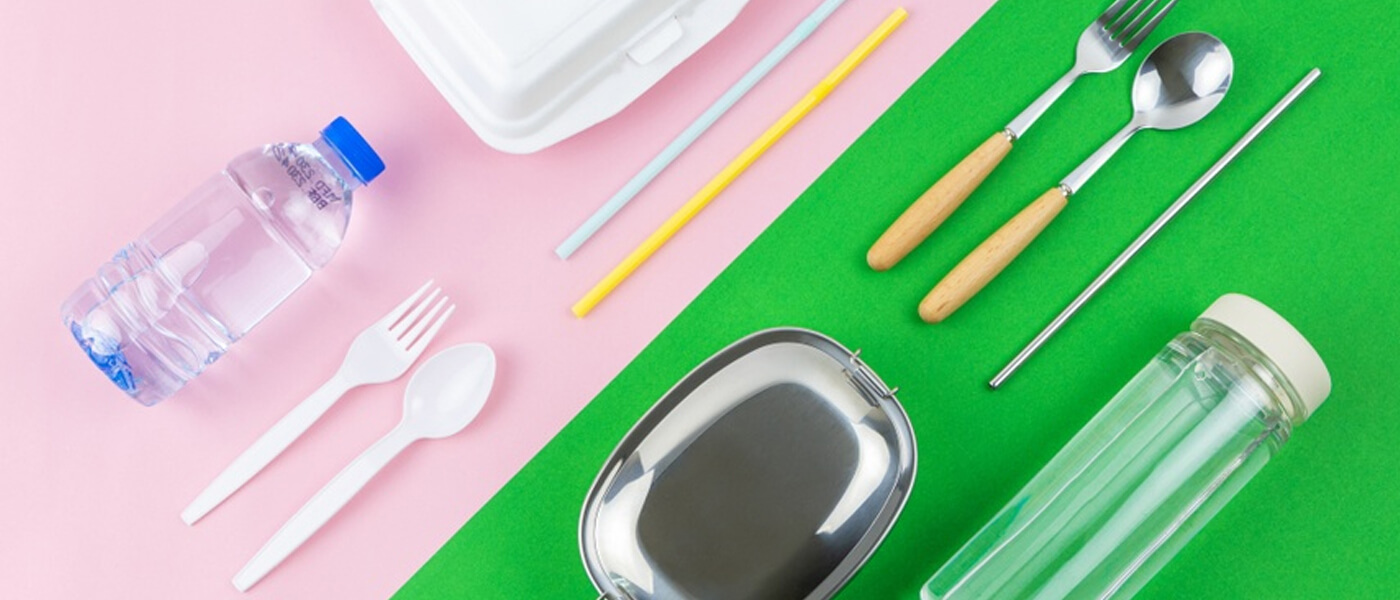
Is it really possible for one to go a day without plastic? While many might think that it may be a challenge, you might be pleasantly surprised that a plastic-free day is very much doable!
As we approach the end of #PlasticFreeJuly, here’s a preview of what a plastic-free day could possibly look like. It’s not too late to start with small simple changes in our everyday routines, and having these changes add up to help us achieve our goal to go plastic-free in the long run!
7am: Ditch that plastic toothbrush and cotton round!
Let’s start the day right with fresh faces and cleaned teeth! Consider eliminating the use of plastic toothbrushes and switch it out for a bamboo one for your morning routine instead. They provide the same quality of cleaning as a plastic toothbrush.
Furthermore, one can easily compost the handles of bamboo toothbrushes, upon removing the nylon bristles, as bamboo decomposes naturally in the environment.[1] Not only will you still be able to keep your teeth fresh and clean, a smaller ecological footprint is left on our planets as well.
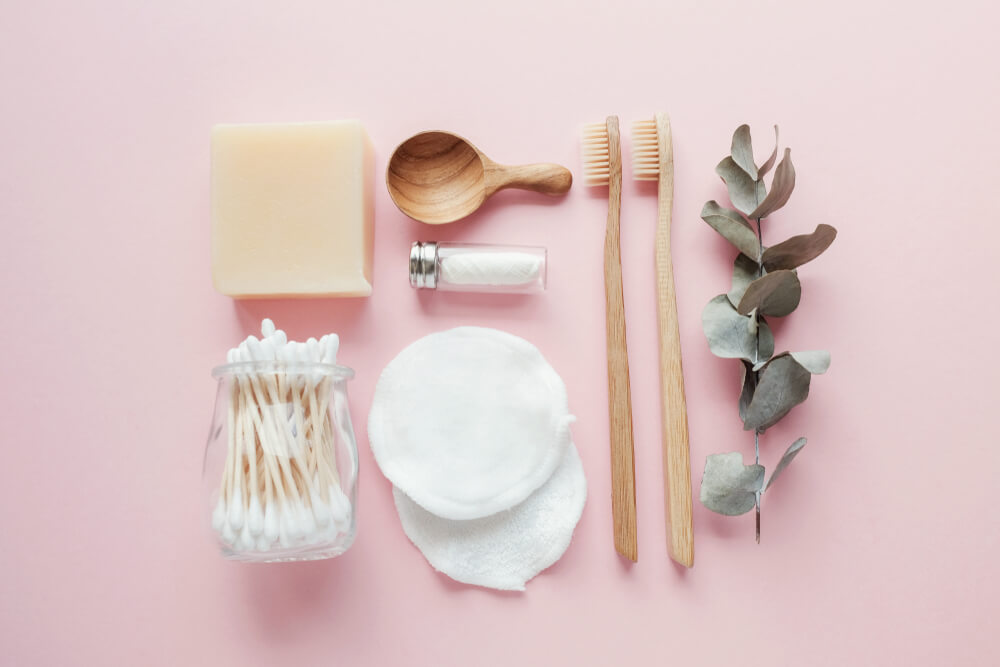
Another easy swap you can do include as part of your morning routine is using reusable cotton pads instead of disposable ones. These reusable alternatives work just the same as the disposable version and offer lots of neat advantages as they are durable, absorbent, and easy to clean. Most importantly, it helps reduce waste as a single cotton pad can be used up to 1000 times, compared to cotton pads which are tossed away after one-time usage.[2]
10am: A plastic-free caffeine fix!
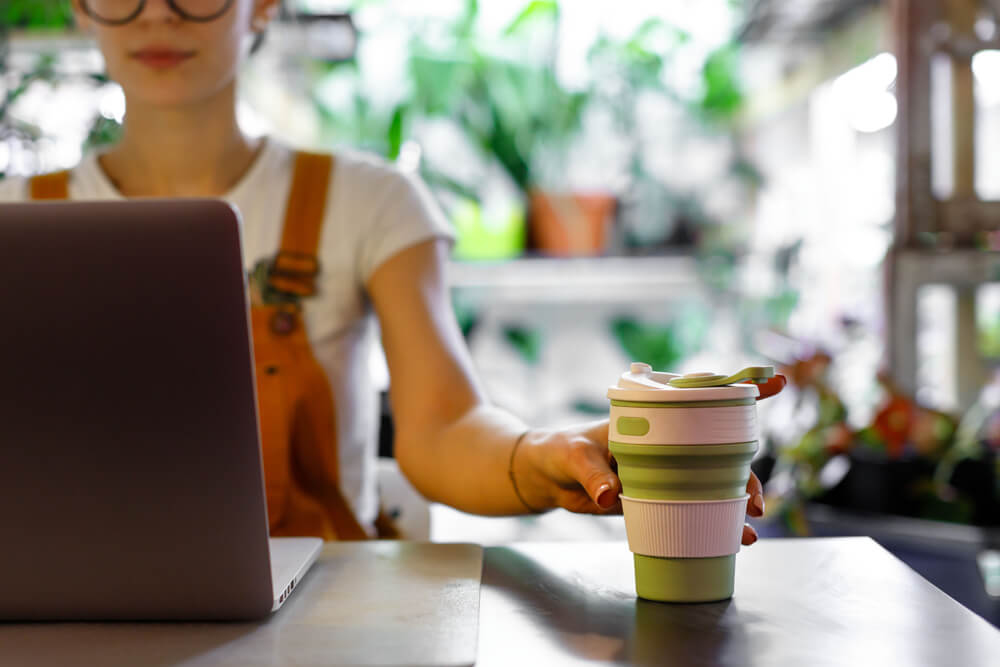
As we jump-start our day, the aroma of a cup of freshly brewed coffee will certainly perk many of us up. Bring along a reusable coffee mug or eco-friendly cup when you get your daily fix from the pantry or the coffee house. If you prefer, you could even bring your own brew from home to the office instead. With every cup of coffee you opt to use your own mug, imagine the number of disposable cups you save from being part of our landfills. Bonus: Many coffee shop locations give you a discount for bringing your own flask.
1pm: Time for a zero-waste lunch
With the lunch crowd often in full force in restaurants and food courts, you might find yourself opting for takeaways at times with your meals coming in styrofoam boxes or disposable containers.
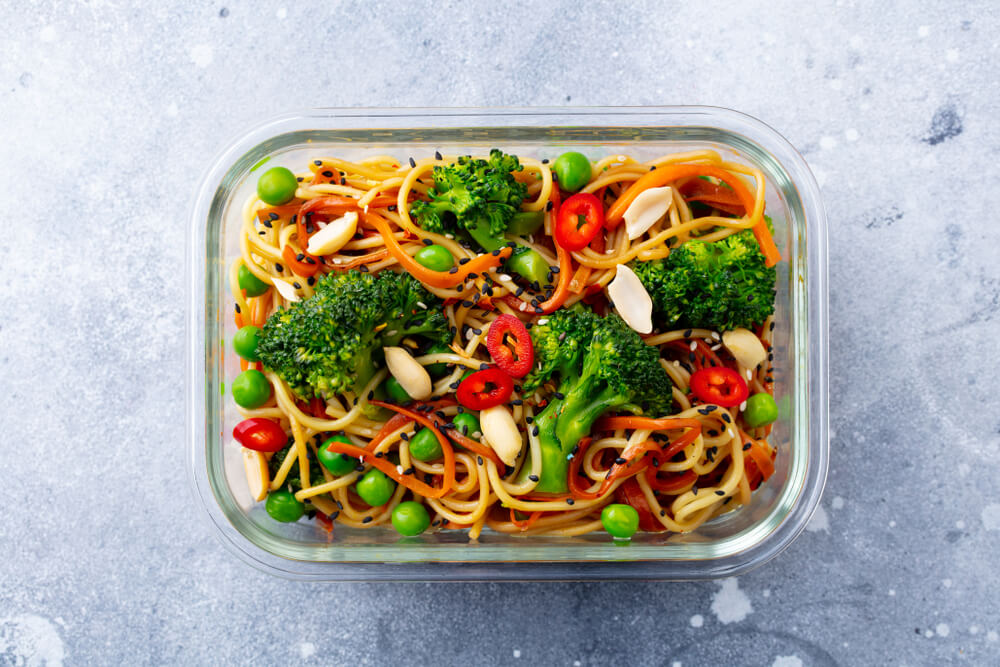
For your next lunch takeaway, bring along a food container to have that meal to go! You can easily keep a spare food container in your office together with a pair of reusable utensils to complete the plastic-free lunch set.
You can even go a notch higher and ignite change by working with your organisation to make such containers available in the office for daily meal takeaways!
4pm: Mid-day treat
With just a couple of hours more till the end of your workday, you might be looking for that sugar rush to help you power through the remaining hours. Bubble tea is one of Singaporeans’ favourite go-to beverage choice and there are ways you can go plastic-free, even when you are getting that much-needed sugar rush!
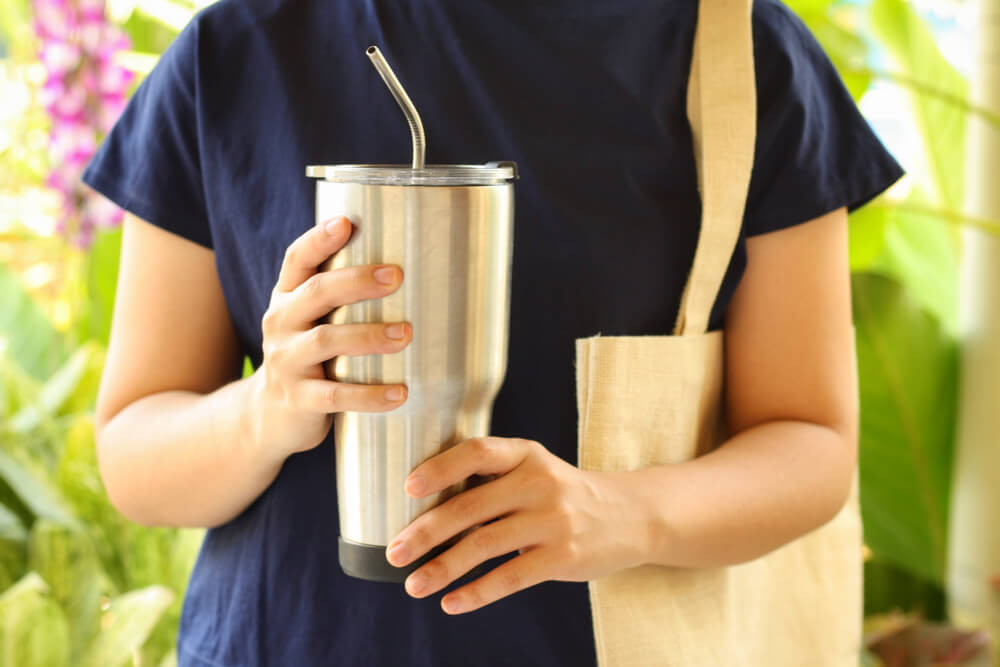
It is as simple as choosing to say no to a carrier when offered at your point of purchase. In fact, take it a step further by having your own reusable straws to enjoy your drink. People in Singapore use about 2.2 million straws daily [3] and a good first step we can all do is to say no to all straws offered.
8pm: An all-natural shower to end off your day
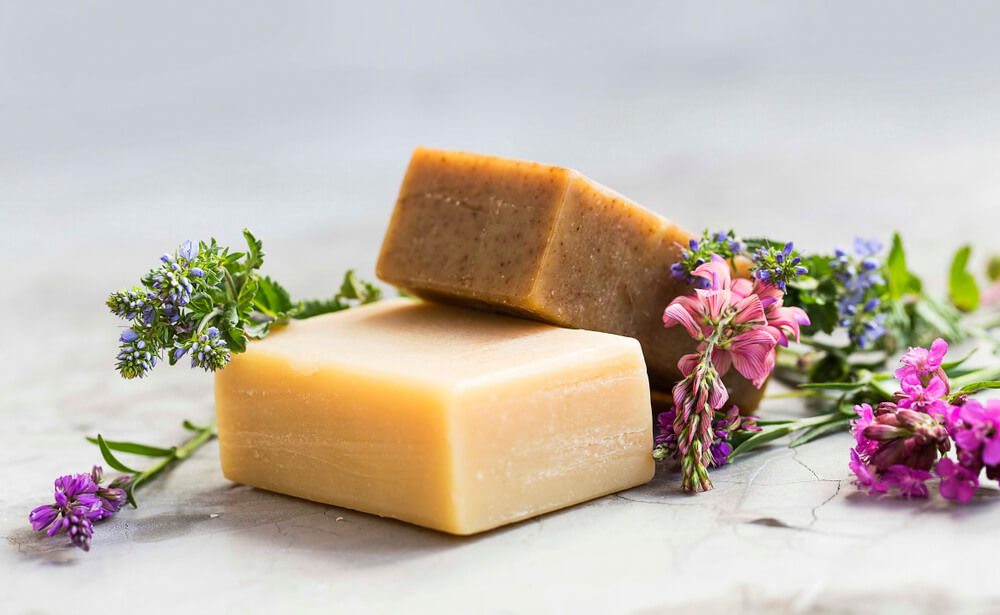
What better way to wind down at the end of the day than with a good shower at home. Why not replace plastic bottles of soap and shampoo with bar soaps in your own bathroom as part of your plastic-free experience? What’s more, there are specially made soaps in the market that can are meant just for your hair or even cater to various skin needs such as Eczema or Rosacea.
Plastic-free daily routine
Start out by switching one habit a day. It may seem challenging at first, but over time with consistent effort and practice, the plastic-free habit will become second nature. Our small actions to promote a plastic-free or plastic-less world can create big impact if we stick to them with conviction! Be a part of the #PlasticFreeJuly movement with Geneco and share with us on how you go plastic-free in your everyday routines. You can even get rewarded just for your plastic-free practices!

With the abundance of resources we have at our disposal, it is vital to not just initiate conversations at home, but also making use of them to educate our children about the various issues concerning our environment.
As we progress as a society, so does the importance of environmental conservation and the onus is not only on us to protect and conserve the environment, but to also inspire and equip the future generations to love and care for a greener and brighter tomorrow.
References:
- [1] Kashinsky, M. (2020, February 27) What are the benefits of using a bamboo toothbrush?
https://bamboodetective.com/what-are-the-benefits-of-using-a-bamboo-toothbrush/ - [2] Gonzalez, D. (2019, March 5). A Sustainable Alternative To Cotton Rounds That's Just As Easy To Use. Huff Post.
https://www.huffpost.com/entry/a-sustainable-alternative-to-cotton-pads-thats-just-as-easy-to-use_l_5ccb200ce4b0913d078e6a4d - [3] Mohan, M. (2019, June 8) Phasing out plastic straws helps the environment, but more needs to be done, say observers
https://www.channelnewsasia.com/news/singapore/phasing-out-plastic-straws-helps-the-environment-but-more-needs-11605108
Image Credits: Nylon Coffee Roasters
Source: The Sustainability Project
Debunking myths about plastic recycling in Singapore
- Home
- 2020 (
- Page 2 )
[Post Date]
Debunking myths about plastic recycling in Singapore
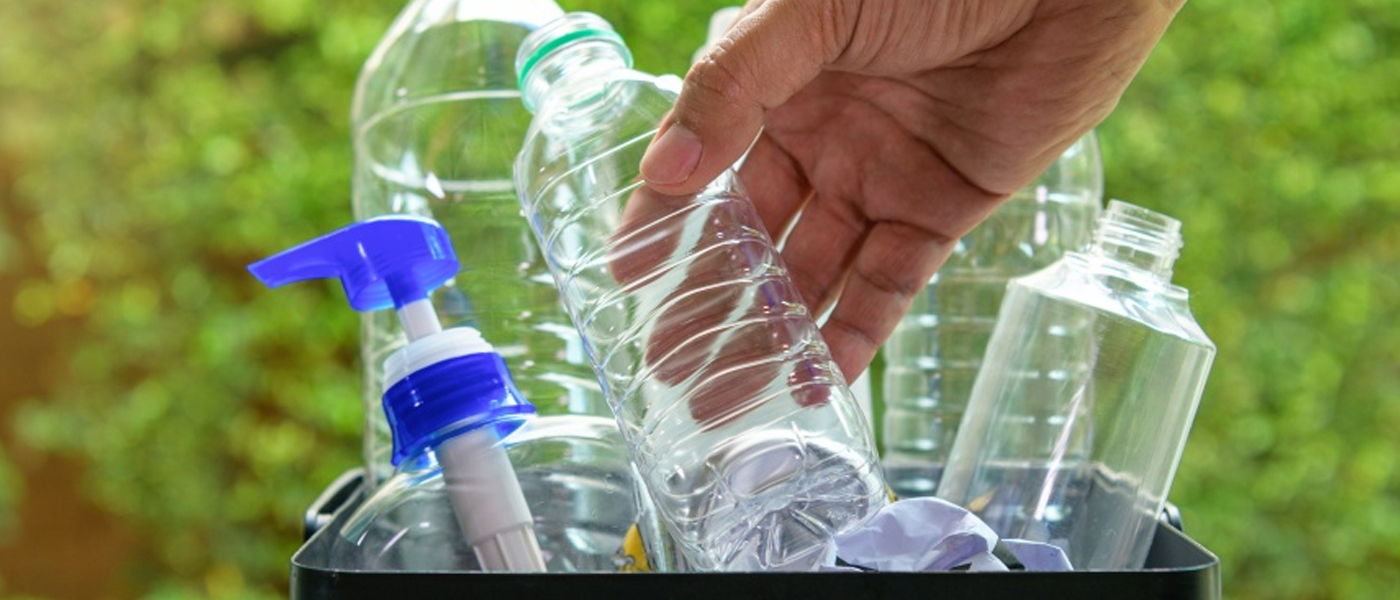
It is undeniable that plastic is one of mankind’s most used inventions. It is lightweight yet strong enough for a variety of applications. It has a low price point for production and can be easily manufactured for various needs across multiple industries. However, plastic waste is becoming a huge problem, especially since it takes a very long time – up to 1000 years, for it to decompose. No doubt a worrying sight, the use of plastic has continued to remain high even in Singapore. This was especially so during the recent circuit breaker where the nation saw an additional 1,334 tonnes of plastic waste generated.[1]
While the government has put in place many recycling initiatives and mapped out a master plan to achieve a zero waste Singapore, recycling rates still remain very low. In 2019, 930,000 tonnes of plastic waste were generated in Singapore, out of which only 4% of it is being recycled.[2] The excessive use of plastics and disproportionate recycling rates have impacted ocean health and biodiversity, further causing plastic pollution.
It is important to realise that our actions have cumulative and significant impacts on the environment, and we must do our part to manage our consumption and disposal of plastics. As we continue to push to cut down on single-plastic use and embark on a plastic-free life ourselves, here are some myth busters to break those misconceptions you may have about plastic recycling and to help you embark on your plastic-free journey!
Myth 1: Biodegradable plastic is good for the environment
Biodegradable = good for the Earth? You might want to re-think that.
According to experts in Singapore, choosing to use biodegradable plastic in Singapore does not make much of a difference as both single-use and biodegradable plastics end up in the incinerator.[3]
Biodegradable plastics make a difference to the environment only when they are buried in landfills where they degrade faster than regular plastic. Unfortunately, this is not the case for Singapore where waste is incinerated and not left in landfills to degrade.
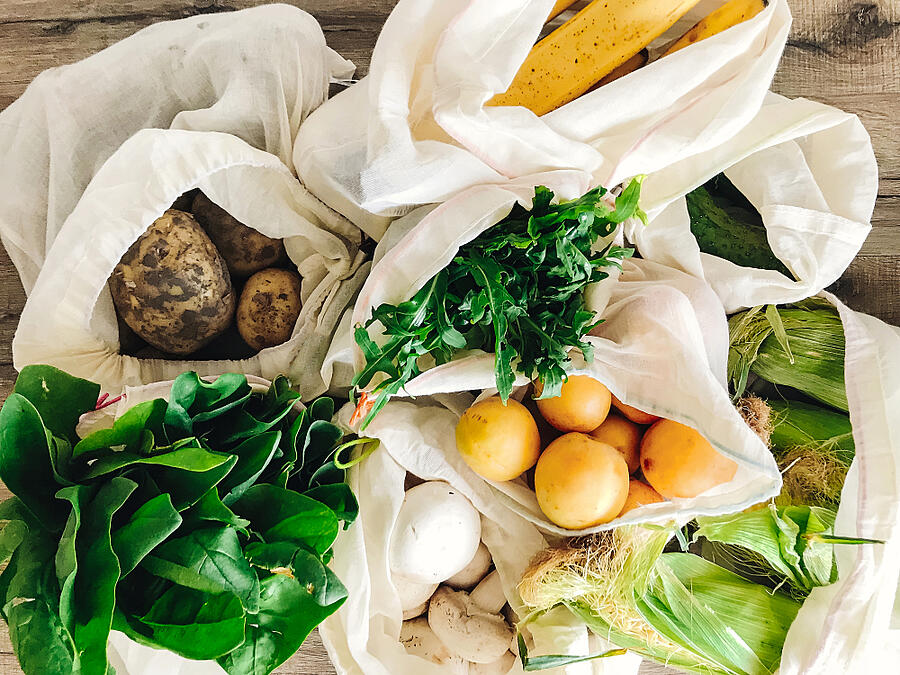
Tip: Before you think that it is alright to make that small exception and use that biodegradable bag, why not opt to carry a foldable eco-bag with you instead. When shoppers choose to use a reusable bag for a year, it is estimated that 125 single-use plastic bags are saved.[4]
Myth 2: All plastics in the recycling bin do get recycled
Contrary to what you believe, items that go into the blue recycling bins may not all eventually be recycled and this is especially the case for plastic.
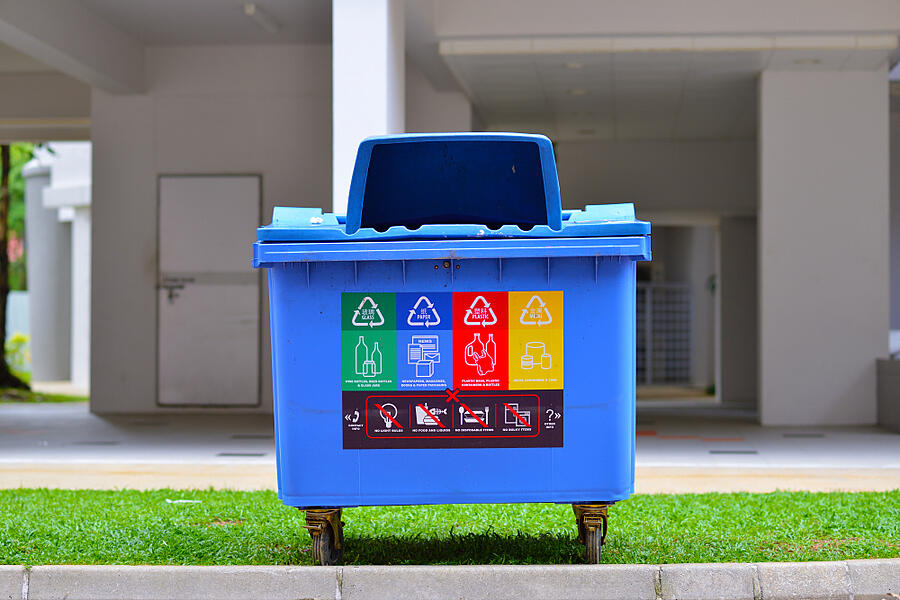
Unbeknownst to most of us, contaminated plastic cannot be recycled.[5] Even if you dispose your shampoo bottles or plastic food containers in the recycling bin with the good intention of having it to be recycled, if they have any form of residue, they are considered contaminated.
They must be thoroughly washed and dried for it to be recycled. This challenge is pertinent in Singapore, where more than 50% of plastic waste collected by companies cannot be recycled due to contamination.[6]
Tip: Remember to do a quick rinse and have them dried once you are done with your usage and consumption. It might seem troublesome at the start but making it a habit can go a long way for our Earth!
Myth 3: Most plastic get recycled and re-made into new products or useful items
Most Singaporeans may not know this, but majority of plastics can only be recycled once or twice before they are downcycled.[7] This means that plastics that have already been recycled once are no longer reusable.
In fact, shoes or any product made from recycled plastic cannot be recycled again and often end up in landfills or are incinerated both having detrimental effects to the Earth by contributing to the amount of greenhouse gas in the ozone layer. One way we can reduce it is by proactively reducing the use of single plastics, rather than just thinking it can always be recycled.
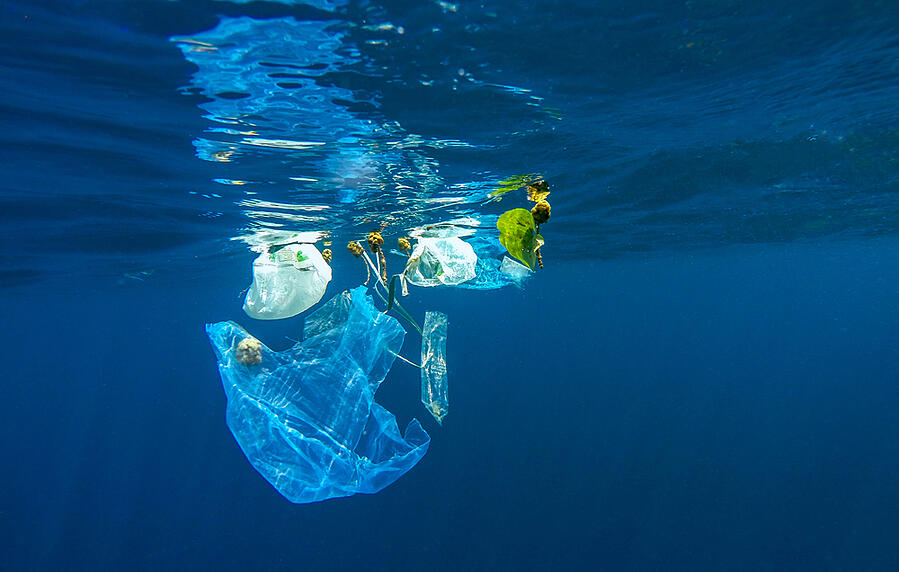
Tip: To get you started, some easy ways will be to opt for no cutlery for your food deliveries when you choose to order in meals for your family. Bringing your own food containers are options as well instead of using single-use plastic.
Myth 4: Coloured plastic can be recycled as well? Think again.
Yes, colour of plastic does make a difference in an item’s recyclability.
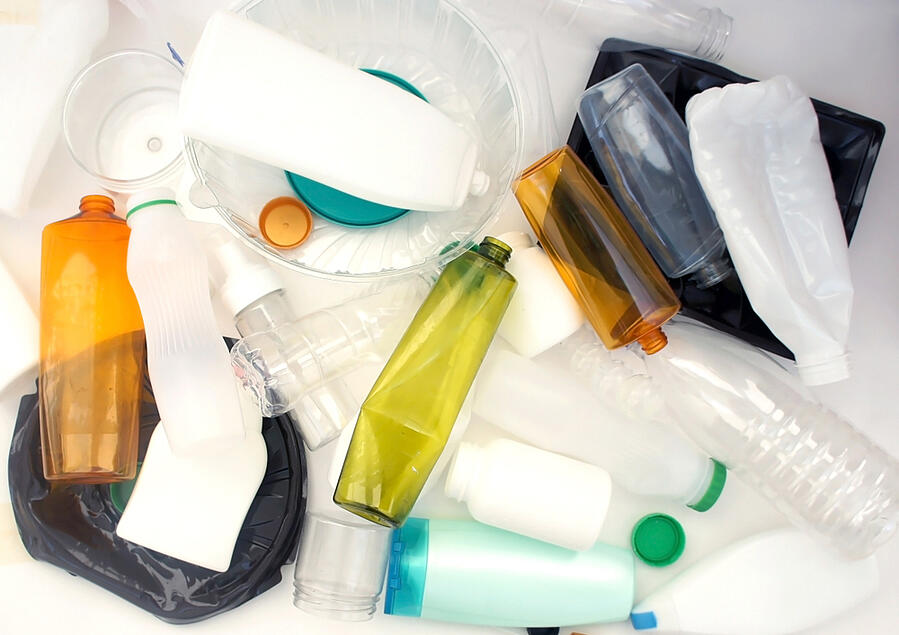
For black and coloured plastic, they usually have a lower market value as they cannot be dyed with flexibility after being recycled. Therefore, non-pigmented, clear, and transparent plastic are preferred over coloured, opaque plastics in the recycling process.[8] Furthermore, the latter is often not recycled as they cannot be easily identified by automatic sorting machines, leaving them undetected in the recycling pile and disposed at landfills.[9]
Tip: To curb this, consumers and producers can opt for non-coloured plastic in packaging. This will ensure that a larger share of what we put in recycling bins and centres do actually end up being recycled.
Towards a plastic-free future
In order for Singapore to cut down on plastic waste and use, it will require the united efforts of consumers, businesses and the Government. The main reasons for a low recycling rate can be attributed to the lack of public awareness on what can be recycled, and the challenges associated with the local recycling industry. Join Geneco as we stand to be part of Plastic Free July to reduce plastic pollution. Be part of our #PlasticFreeJuly movement here and share with us on your plastic-free practices and habits. After all, change begins at home and together our individual actions can lead to others among our friends and family to follow suit.
References:
- Elangovan, N. (2020, June 5) Singapore households generated additional 1,334 tonnes of plastic waste during circuit breaker: Study, Today Online.
https://www.todayonline.com/singapore/singapore-households-generated-additional-1334-tonnes-plastic-waste-during-circuit-breaker - [2] Waste Statistics and Overall Recycling. (n.d.). National Environment Agency.
https://www.nea.gov.sg/our-services/waste-management/waste-statistics-and-overall-recycling - [3] Ang, H. M. (2019, September 9). Biodegradable plastic alternatives not necessarily better for Singapore, say experts. CNA.
https://www.channelnewsasia.com/news/singapore/biodegradable-plastic-alternatives-not-necessarily-better-for-11854322 - [4] Kiew, J. (2019, July 3). Donation bins for reusable bags launched at supermarkets. The Straits Times.
https://www.straitstimes.com/singapore/donation-bins-for-reusable-bags-launched-at-supermarkets#:~:text=When%20shoppers%20use%20a%20reusable,by%20the%20National%20Environment%20Agency. - [5] 7 Things You Didn’t Know About Plastic (and Recycling). (2018, April 4). National Geographic Society Newsroom.
https://blog.nationalgeographic.org/2018/04/04/7-things-you-didnt-know-about-plastic-and-recycling/ - [6] Quah, J. (2018, September 25). How Singapore's plastic waste is recycled. Today Online.
https://www.todayonline.com/singapore/how-singapores-plastic-recycled-3 - [7] Howard, B. C. (2018, October 31). 5 recycling myths busted. National Geographic.
https://www.nationalgeographic.com/environment/2018/10/5-recycling-myths-busted-plastic/ - [8] Szaky, T. (2015, April 22). The Many Challenges of Plastic Recycling. Sustainable Brands.
https://sustainablebrands.com/read/waste-not/the-many-challenges-of-plastic-recycling - [9] George, S. (2018, August 2). Why can’t all plastic waste be recycled? The Conversation.
https://theconversation.com/why-cant-all-plastic-waste-be-recycled-100857
Image Credits: Nylon Coffee Roasters
Source: The Sustainability Project
Eco-friendly habits to keep as we enter a new lifestyle phase
- Home
- 2020 (
- Page 2 )
[Post Date]
Eco-friendly habits to keep as we enter a new lifestyle phase
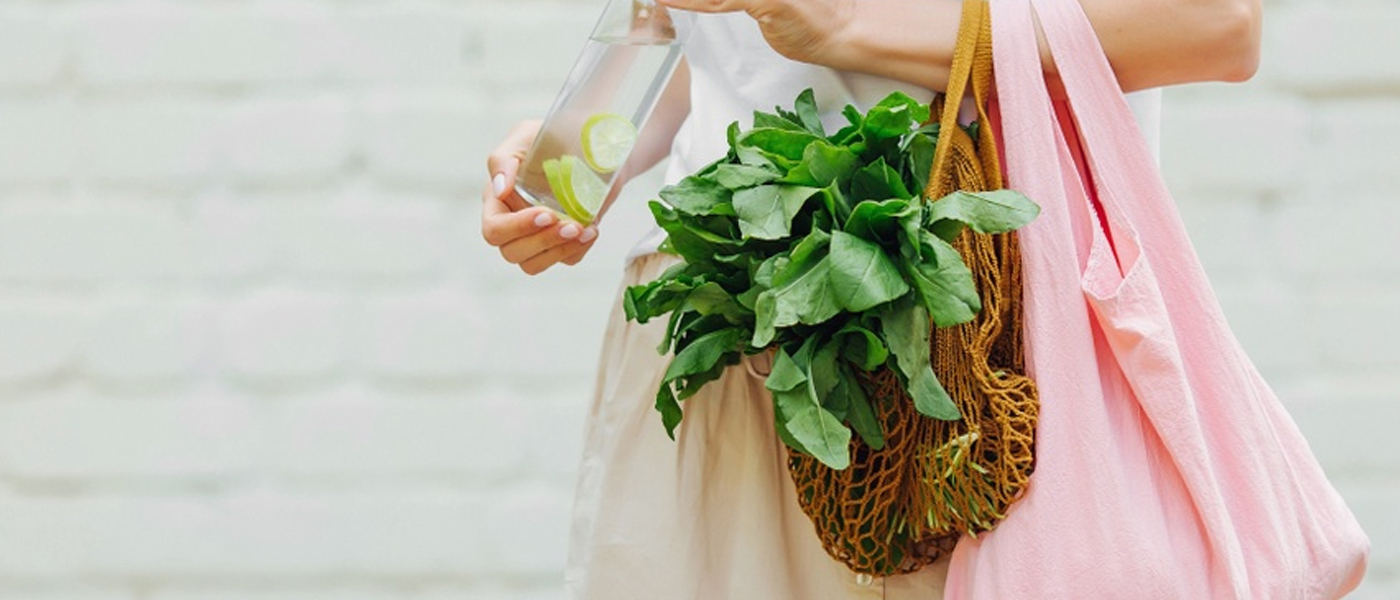
The world was a much different place a few months back when we were greeted with the news of having to stay in for the greater good. Navigating through those months were no doubt one of the biggest changes in lifestyle we have had to experience. As countries worldwide have started to ease lockdown restrictions, let us continue practicing the sustainable habits we have adopted in our day to day lives. Combating climate change is still very much a global challenge that everyone needs to play their part in:
1. Grow your own produce
It is little wonder that there has been more interest in home farming during this period as more people try their hand in growing their own microgreens, herbs, and edibles in their own homes.
The sprout of this hobby might have been no surprise with more people exploring new passion projects while staying in. Having a hand at tending to your own garden and harvesting your own produce have not only helped to promote sustainable eating, it has also shed light on the importance of food security in Singapore.
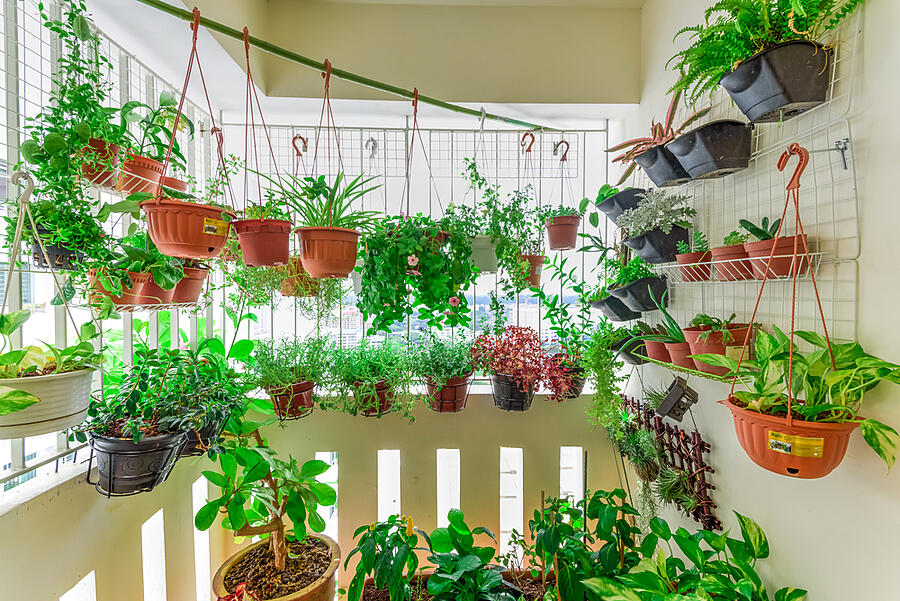
Many parents have even gotten their children on board by showing them how easy it is to have a hand in growing their own food using green beans or vegetable food scrapes. Others, who ignited their passion for the hobby, took their green fingers to the next level by growing their own vegetables such as bak choy and lady fingers within their homes.
The best part about joining this community of green enthusiasts? There are plenty of gardening groups and experts who are open and willing to share their tips and knowledge on how to start and manage your own home gardens! Cultivate Central, one of our ChangeMaker partners have been championing and supporting a grow-your-own culture since their inception. They have recently launched various content on their Instagram page on how anyone can start their own home gardens, even within small spaces.
2. Planning your meals
Food has certainly become one of the highlights to our days at home. Planning ahead for meals and when to slot in that sweet treat of the week might have become second nature to us all!
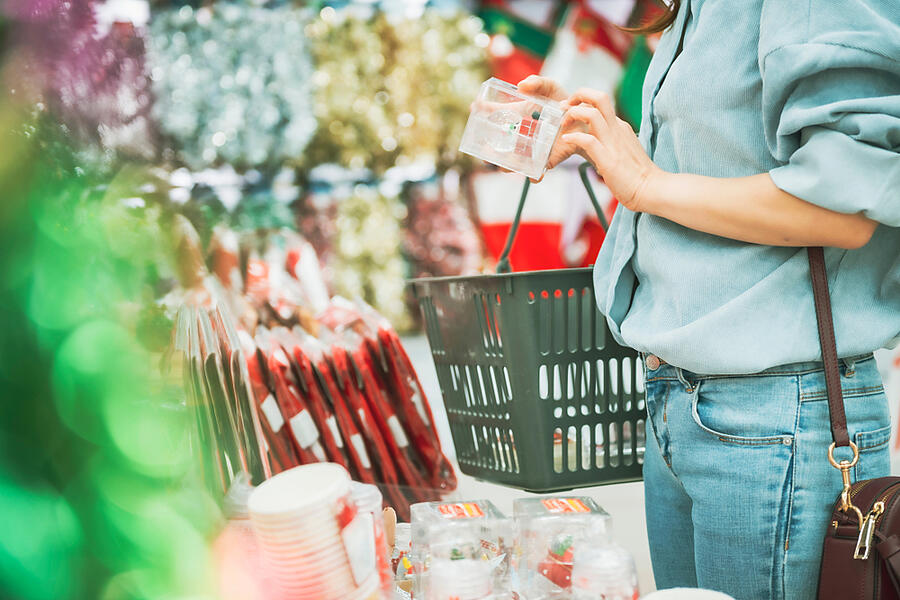
By planning your meals ahead of time, it helps you keep track of what you are eating and ensures a balanced diet is maintained. Also, having a list of ingredients needed for the week, helps to make sure we buy only what is necessary to prevent food wastage.
Other perks of planning your meals include being able to be creative at home and trying out new recipes that you probably have been putting off for a while. Among your friends and family, you might have discovered hidden gems who are actually master chefs in the kitchen.
3. Support Local
In a bid to help homegrown businesses to continue running and stay alive, its heart-warming to see Singaporeans start various initiatives and encourage everyone to play whatever part they can to show some love and help local businesses tide through. Some of the ways that Singaporeans have pitched in include buying gift vouchers or choosing to support local hawkers.
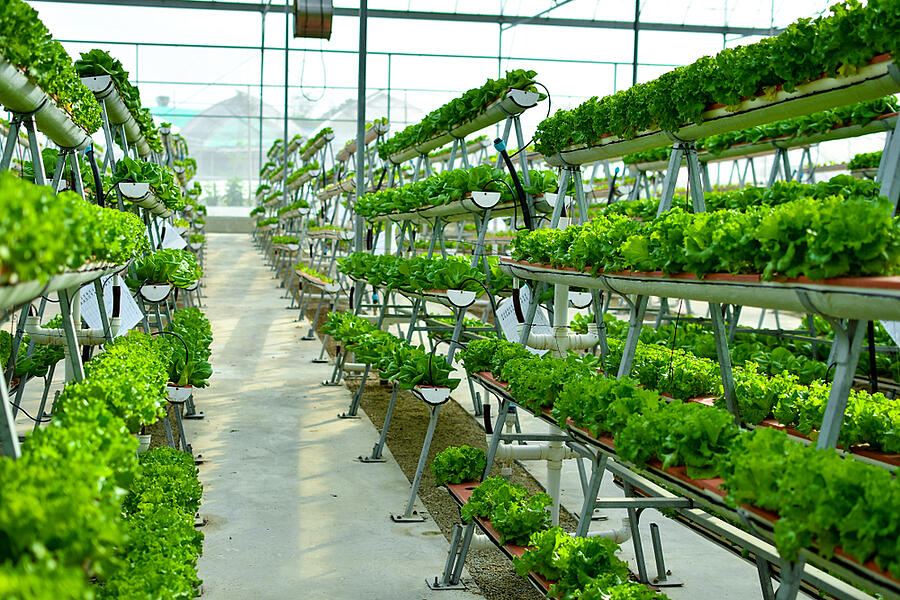
Many Singaporeans have also turned to buying local produce in their support for local farms. One of Geneco’s ChangeMaker ComCrop, makes use of unused rooftop spaces to grow their produce in the heart of Singapore to reduce carbon footprint for locals and complete the farm-to-table experience. Supporting farms like them not only ensures that they stay in business, but it continues to champion for Singapore’s steady flow of local produce to greater ensure the nation’s food security.
4. Bring your Own
With every takeaway and delivery, it is hard to ignore the amount of plastic that has piled up from the past couple of months. Singaporeans have however, been encouraged to bring their own clean containers when doing takeaways from their favourite food establishments and opting to turn down single-use cutlery when ordering through delivery apps.
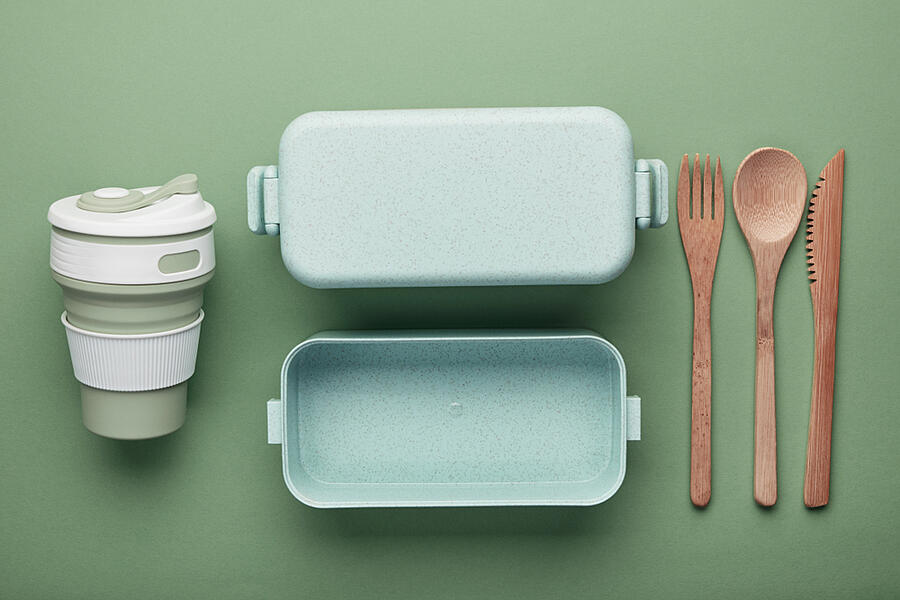
Last year, plastic waste alone accounted for 30% of Singapore’s three million tonnes of trash. As we continue to practice safe distancing and enjoy our favourite local delights from the comfort of our homes, we can continue to ingrain this habit of using our own containers to reduce pollution in the landfills.
5. Conserve Energy
Working from home has become the de facto norm so much so that it has extended the hours we spend on our desktop daily. Therefore, it is hardly surprising that you will see a shift in your energy consumption at home with an increased amount of time the lights and air-conditioned remain turned on. This also translates to higher electricity bills and a greater impact on the environment.

Therefore, be responsible in your electricity usage and conserve where you can save money. Inculcate positive habits to keep electricity bills low and continue to adopt them as we enter the “new normal”. Some easy habits that Singaporeans can continue to practice at home include using natural light whenever possible or unplugging electronic devices when not in use.
We have seen how by coming together, the world can affect real change. The fight against climate change might seem like a tall order at this junction, but everyone must know that individual actions do add up and contribute to saving the environment. A global community is what we have become so let’s not lose this opportunity as we strive to keep these habits in our daily lives and make a difference for the Earth and future generations.
References:
- Elangovan, N. (2020, June 5) Singapore households generated additional 1,334 tonnes of plastic waste during circuit breaker: Study, Today Online.
https://www.todayonline.com/singapore/singapore-households-generated-additional-1334-tonnes-plastic-waste-during-circuit-breaker
Image Credits: Nylon Coffee Roasters
Source: The Sustainability Project
Green energy for your home: How going green could be easier (and more affordable) than you think
- Home
- 2020 (
- Page 2 )
[Post Date]
Green energy for your home: How going green could be easier (and more affordable) than you think
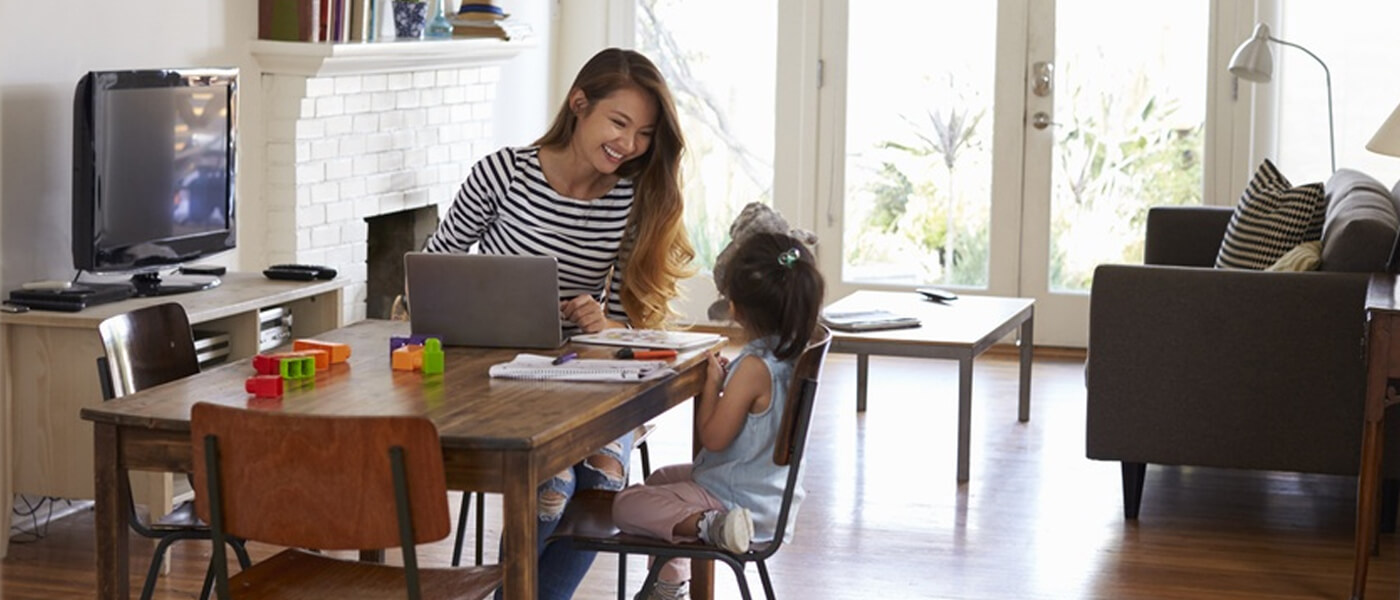
As working from home remains the norm for most of us, it is no surprise that more energy will be consumed over the next couple of months. With more frequent usage of our laptops and home appliances, we need to pay greater attention to our electricity consumption habits.
Easy changes we can make include, choosing the fan over the air-conditioner, or simply unplugging your electrical appliances whenever they are not in use. But more than that, Singaporeans should choose to go green with eco-friendly energy alternatives for your home.
Why choose green energy?
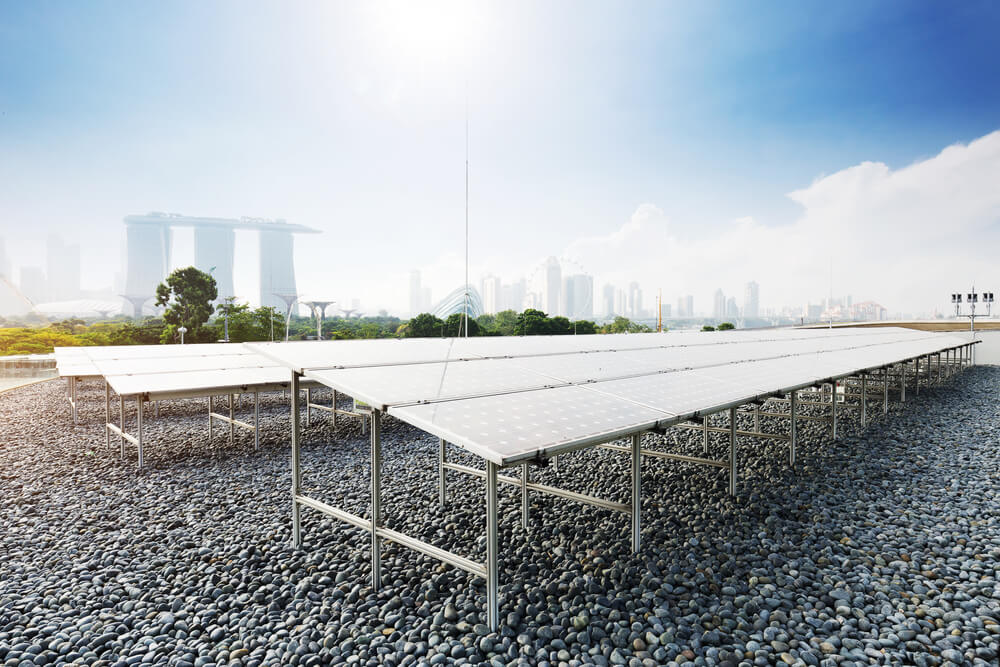
Green energy, also known as renewable energy, refers to energy derived from natural resources such as sunlight and wind. As these resources are potentially infinite, they can be used again and again.
Renewable energy also has a positive impact for future generations, unlike the conventional method of generating electricity by burning fossil fuels.
Fossil fuels such as coal, oil, and natural gas are resources that will diminish eventually with continued use. While it may not affect our generation now, these resources will undeniably and most definitely run out in the future
Moreover, the burning of fossil fuels emits greenhouse gases, which is the main culprit of global warming.
With a growing world population and a developing economy, more energy will be required. There need to be a collective effort in finding more sustainable ways of producing it and integrating it into our daily lives. Driving towards a low-carbon future with green energy remains a key priority for our future generations.
Going carbon neutral
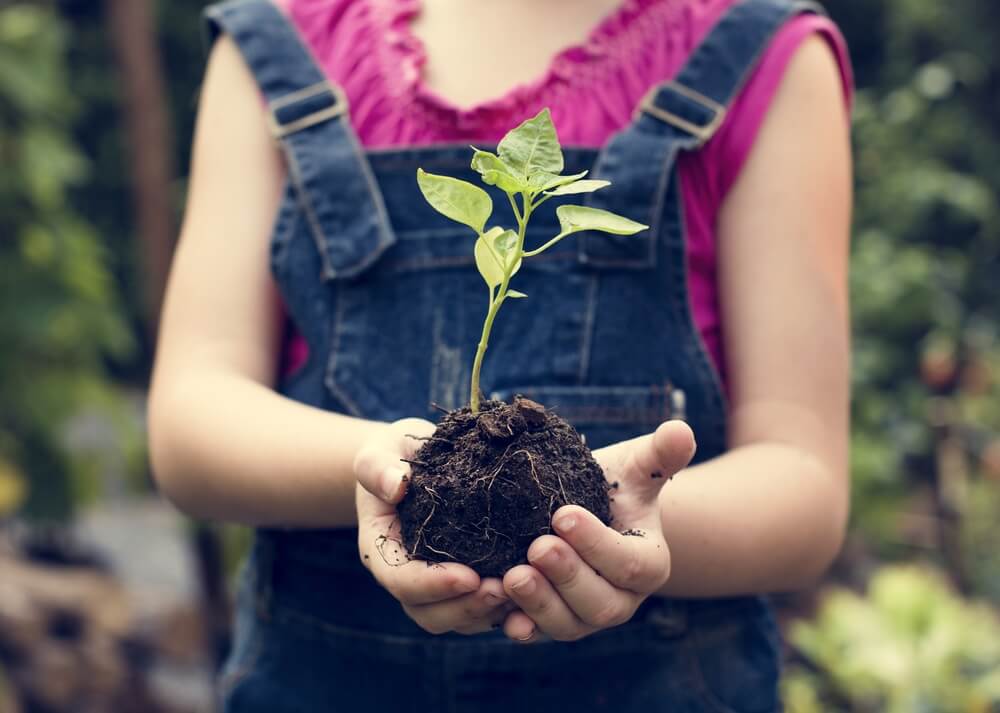
While a full transition to green energy would be the most ideal solution, most companies and organisations often face limitations in doing so for the corporate activities. How then can we play our part as individuals?
Enter Carbon Neutrality.
Going carbon neutral is a practical and affordable way for individuals to take responsibility for your carbon footprint. With the amount of greenhouse gases that were added to the atmosphere because of your consumption, it contributes to the overall carbon footprint generated by you.
By going carbon neutral, it allows you to offset the emissions released, and this can be done through the purchase of carbon credits. These credits will then be channelled to help fund projects that reduce carbon or greenhouse emissions. Examples of these projects include, updating power plants and factories, or increasing the energy efficiency of buildings and transportation.
Energy Savings, Cost Savings
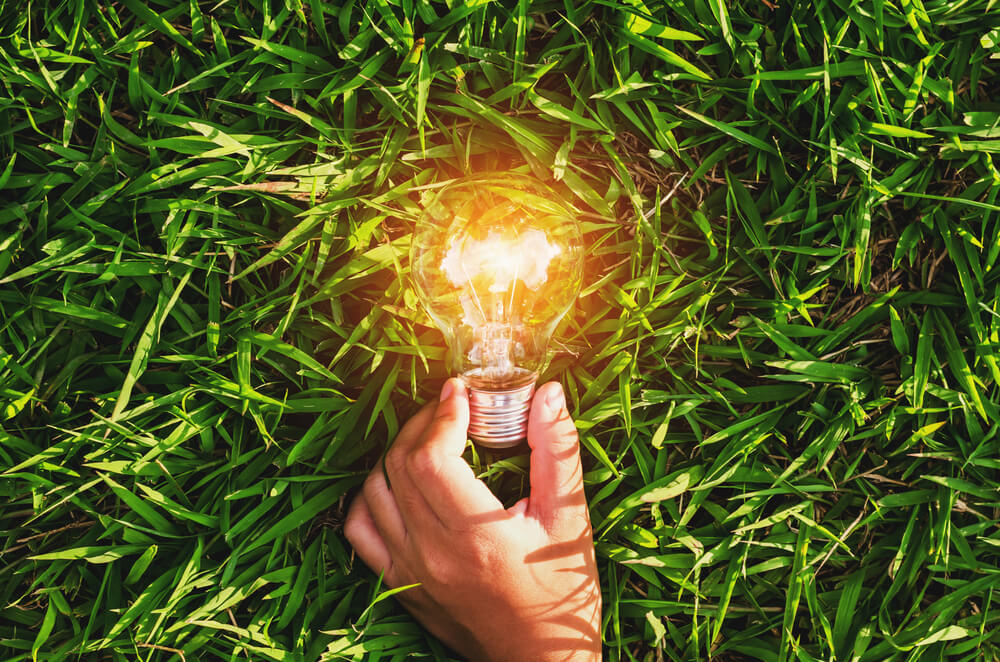
Geneco is committed to power change for a more sustainable energy future. With our Get It Green plan, a 100% carbon-neutral electricity plan, you can go green with every kilowatt per hour of energy consumed.
With Geneco’s Super Saver campaign between June and July, enjoy the lowest rate of 17.45 cents per kWh and be an eco-warrior at no extra cost.
Choosing to power your home with green energy may seem like a small, insignificant change, but it is these small actions we choose to adopt in our daily lives that can collectively make a big difference for the future generations to come.
Do your part to reduce your carbon footprint and help power a more sustainable world.
For more information about Geneco’s “Get it Green” plan, visit the link here.
References:
- Elangovan, N. (2020, June 5) Singapore households generated additional 1,334 tonnes of plastic waste during circuit breaker: Study, Today Online.
https://www.todayonline.com/singapore/singapore-households-generated-additional-1334-tonnes-plastic-waste-during-circuit-breaker
Image Credits: Nylon Coffee Roasters
Source: The Sustainability Project
#PowerTheChange with Geneco: What will you choose to power today?
- Home
- 2020 (
- Page 2 )
[Post Date]
#PowerTheChange with Geneco: What will you choose to power today?

Here at Geneco, we strive to be more than just an electricity retailer. Through our social initiatives, we want to make meaningful contributions to individuals and society alike where we embrace the values of sustainability, giving and positivity.
This is especially important now. With daily news surrounding the COVID-19 situation, spirits have been dampened with lives everywhere becoming increasingly difficult and stressful by the day. Learning about businesses going into recession and figures of retrenchment, it seems difficult for most of us to remain positive.
Channelling the Right Energy
In the current climate, we choose not to be bogged down by negativity and pessimism. Instead, we at Geneco believe in the importance of focusing on what we have and what we value to power through this period.
Our intent is to motivate, uplift and inspire Singaporeans during this period, seeking ways to power different qualities such as togetherness and love within their lives. We want to show people that despite these difficult times, there remains many opportunities to uplift and empower those values within ourselves and those around us.
With this in mind, we launched #PowerTheChange – a social campaign aimed towards seeking out inspiring qualities shown by ordinary Singaporeans. Featuring stories of strength, compassion, and unity displayed within our communities, we hope to motivate Singaporeans as we weather this challenging time together.
Sharing Powerful Stories of Gratitude, Compassion, and Progress
One of the featured profiles was David Hoe, founder of Project Stable Staples – a ground up initiative helping disadvantaged households who have lost their incomes due to the COVID-19 situation. By sending them weekly grocery vouchers, the initiative hopes to provide each home with some “stable staples” every week.
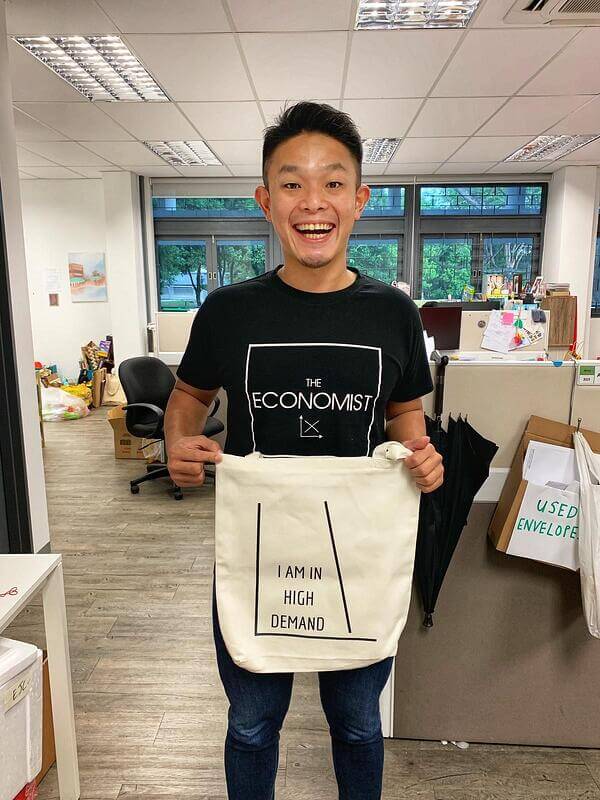
David Hoe during his teaching days
Coming from an underprivileged background himself and losing his mother at a young age, David received plenty of help from his peers and mentors who helped him through his difficulties to become a teacher and eventually a Community Partnerships Officer with MOE, where he supports students from disadvantaged families. His gratitude and mantra of ‘paying it forward’ was what inspired him to start Project Stable Staples.
To date, David’s project has supported more than 266 families living in rental flats, with his social initiative set to help even more.
David chose to power kindness.
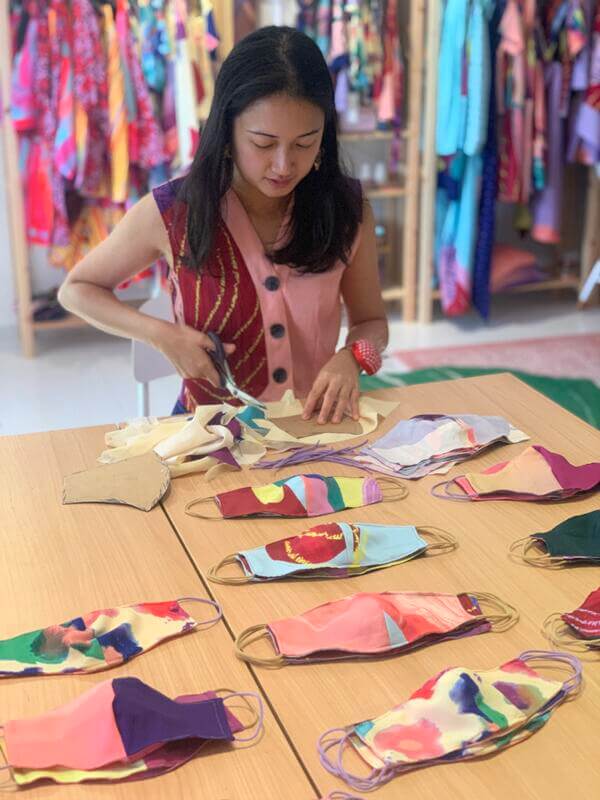
Founder of fashion label, Minor Miracles, Dawn Bey hand stitching masks to raise funds for migrant workers
Another inspiring story was from Dawn Bey, founder of Minor Miracles who displayed empathy and compassion in reaching out to employ fashion graduates who are unable to find jobs due to the current situation. Dawn and her new employees put their sewing skills to use by stitching and crafting face masks using leftovers from Minor Miracle’s signature colourful fabrics to be sold to the public.
All profits made from selling the masks were subsequently donated to charities supporting migrant workers and community services.
Dawn chose to power compassion.
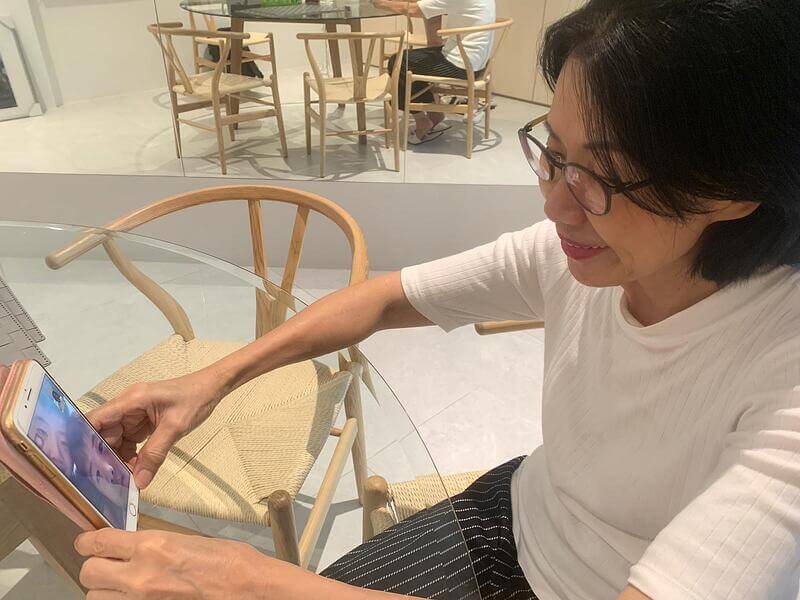
Homemaker Helen Goh, spending time with her grandchildren using video call
Last but not least is a homemaker who led an exciting life. Helen Goh was a business owner, a manager and held many other jobs throughout her working life. She adapted quickly to changing environments and constantly learned new skills to stay relevant.
Even as a grandmother now, she has not forgotten that learning is a lifelong pursuit. To stay connected to her family during the circuit breaker, Helen familiarised herself with technology and video call apps so that she could continue seeing her children and grandchildren, even while they are apart.
Helen chose to power progress.
Geneco’s #PowerTheChange Efforts
Aside from sharing such inspiring stories in times of gloom, Geneco is also committed to make a difference within the community. Our #ChangeMakersSG programme promotes collaboration between ourselves and other green advocates. In this spirit of partnership and togetherness, we want to do our part by supporting our ChangeMakers’ initiatives, creating a cohesive community to reach out to the disadvantaged around us.
Refash, one of our ChangeMakers, was facing difficulties when all nine of their retail outlets were forced to close as part of the circuit breaker measures, causing the brand to lose its revenue streams. Fortunately, Refash was able to quickly turn the situation around, by sourcing for 3-ply masks to be sold to the public as an alternative revenue stream to keep their business alive.
To support of our ChangeMaker, whilst understanding the crucial need of masks among Singaporeans even after the Circuit Breaker period, Geneco purchased 15,000 masks from Refash to be distributed to the less privileged in Singapore. To bolster this initiative, we also brought The Food Bank SG on board to help distribute these masks as they deliver food to vulnerable communities.
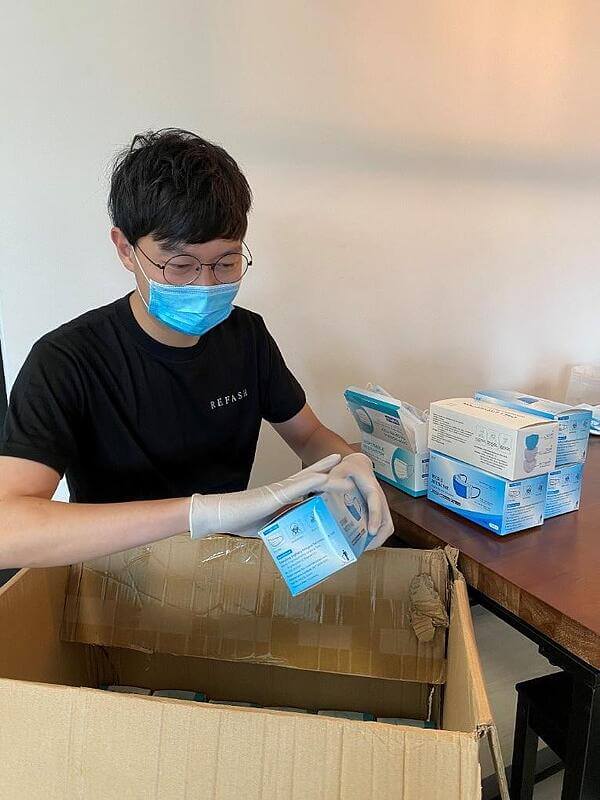
Aloysius Sng from Refash packing the masks before they are distributed through Food Bank SG’s channels
Besides powering togetherness with Refash and Food Bank, Geneco has not forgotten to power sustainability, one of the core values which remains crucial to us.
Our ChangeMaker, ComCrop, is Singapore’s first rooftop greenhouse making use of advanced hydroponic techniques to farm their vegetables, which allows them to utilise 90% less water than traditional farming methods. With these tools at hand, ComCrop aims to build a sustainable future whereby Singaporeans can have access to healthy and locally produced food from their supermarkets.
With the current COVID-19 situation, many countries have been placed in lockdown, inevitably causing a disruption in our country’s food supply chains. As a result, ComCrop is currently standing at the forefront of our country’s food production efforts to maintain our nation’s food security, while at the same time fulfilling the government’s ’30 by 30′ goal: cultivating enough food locally to meet 30% of the country’s nutritional needs by 2030.
However, with the rising demand placed on local farmers, ComCrop’s rooftop greenhouse is experiencing a greater strain to increase production, as they continue to cultivate fresh and pesticide free produce to feed Singapore’s nutritional needs.
To do our part in strengthening sustainable food production in Singapore, we at Geneco have also committed to subsidise ComCrop’s electricity bills for a year in support of their sustainability efforts.
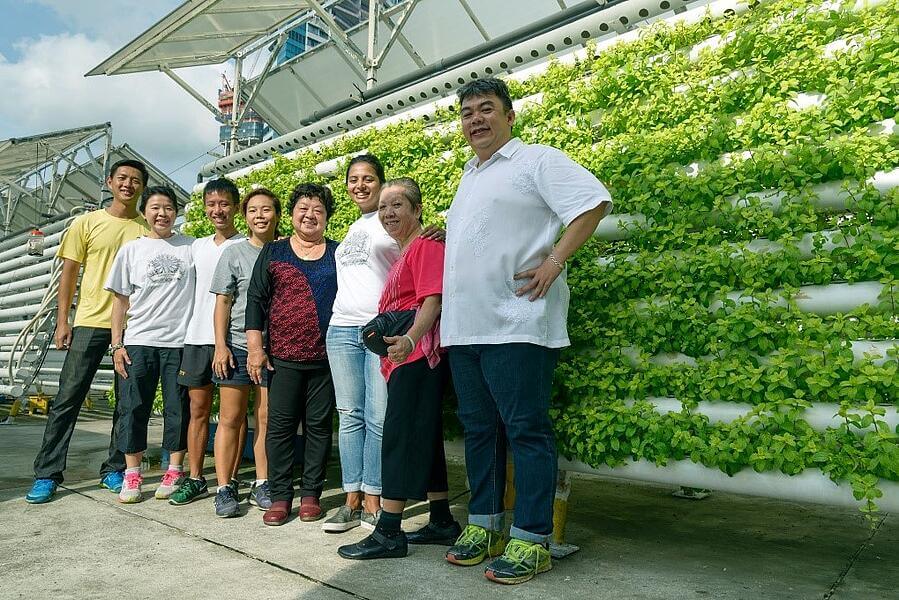
ComCrop team members posing with their rooftop farm
We hope that our #PowerTheChange campaign will inspire Singaporeans to choose positivity as we emerge gradually from the various stages of our country’s lockdown.
Each person’s story is different, and every scenario distinct, but with the correct mindset and motivation, each one of us has the opportunity to inspire different qualities of goodness within our lives, and to the lives of those around us.
Together, we can join hands to power change in many different ways.
What will you power today?
Click here to watch the video
Celebrate International Day of Families and remember to spend quality time with your loved ones
- Home
- 2020 (
- Page 2 )
[Post Date]
Celebrate International Day of Families and remember to spend quality time with your loved ones

Each year on May 15, we celebrate International Day of Families by appreciating the importance of families around the world. This year, a different set of circumstances has presented abrupt changes in our day-to-day routines for many of us, as we observe safe-distancing measures.
However, this also provides a great opportunity for family bonding as we spend more time with each other. In between juggling the “new-norm” of working from home with new household demands, we may in fact be spending less quality time with our families than we expect.
Therefore, let’s make this a special day by creating conscious efforts to continuously support and care for each other. Here are four tips to help you keep family a priority:
Regular morning check-ins
It isn’t always easy for parents to work from home. Children may require plenty of attention from their parents during working hours. Some may even feel neglected due to the lack of attention despite their parents being home all the time.
Therefore, try to explain the situation with your children. Start the day by having a chat with them to explain your work schedule. This way, you can continue your day with the assurance that your child understands the time limitations imposed upon you by work commitments.
To complement this, draw up a structured timetable for the kids to follow. Should they need your help with schoolwork along the way, set aside some time within both your schedules to address them. Letting them understand your work schedule whilst demarcating your out-of-bound hours should help set the boundaries for you to get work done as well.
You can even make your own timetable at home this weekend simply by reusing materials around the house and embark on a green craft as a family.
Set reminders for important dates

It’s easy to lose track of dates and forget important occasions such as anniversaries and birthdays when you have been staying indoors for an extended period. Set reminders on your calendars, bookmark these special days and make plans to show your loved ones the care and concern they deserve. After all, nobody enjoys being forgotten and neglected, especially during this stay-home season.
To celebrate these occasions at home, consider holding an indoor themed party for the family or whip up their favourite dishes as part of their birthday meal!
For extended relatives and family members you may live apart from, surprise them with their favourite meals using food deliveries for a simple yet effective way to show them how important they are to you. Just remember to be sustainable by picking the “no plastic cutleries” option whilst ordering!
No work on the dinner table
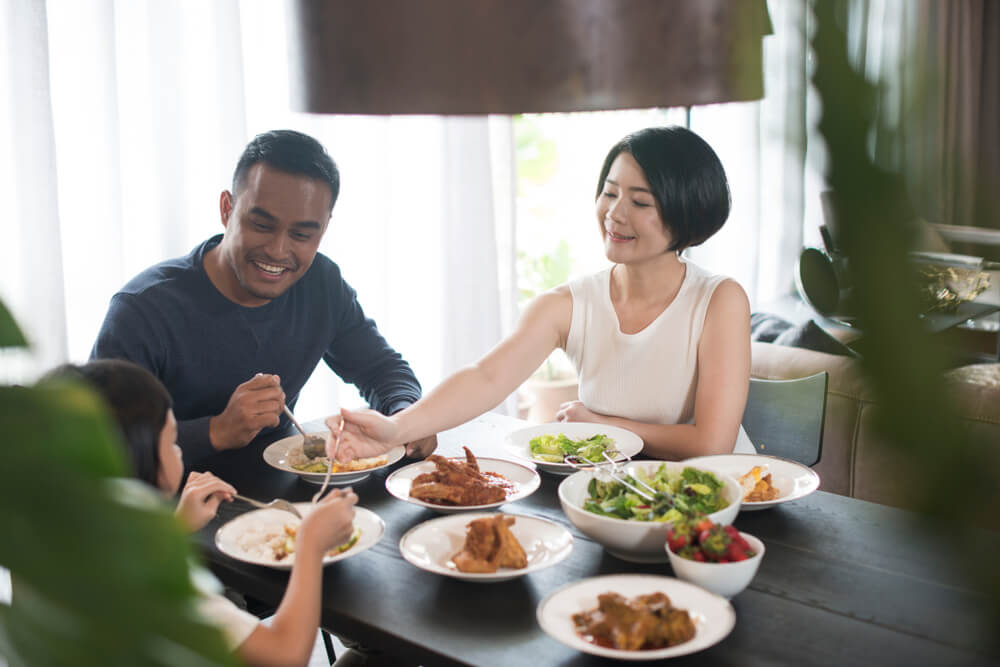
As your workload increases, you may find yourself too busy to enjoy mealtimes with the family. Consider taking a step back to savour and focus on these moments that most of us tend to take for granted. As such, set aside a little time to connect with each other will no doubt go a long way to strengthen ties between family members.
You can plan for special dinners over the weekend, and get the whole family involved in the meal preparations. Add a finishing touch to your dishes with homegrown herbs, such as basil or mint, from your very own food scrap garden, making the meal extra meaningful and delicious!
Try something new together
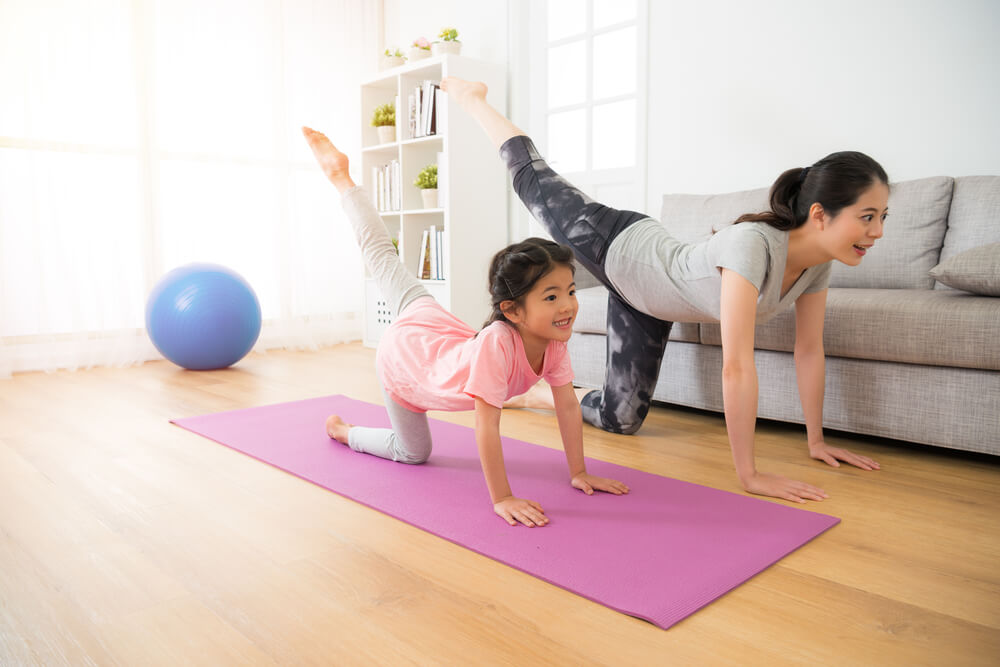
Staying at home also makes for an excellent opportunity for families to attempt new activities together, such as trying new workouts that you previously didn’t have time for. Not only will this help you stay active and fit, you’ll get to spend quality time with your nearest and dearest. From yoga and pilates to intense cardio sessions, there is an abundance of workouts online for families to choose from.
If fitness isn’t your thing, consider other activities such as watching a movie you have been putting off or picking up new creative skills like painting as a family. You can upcycle items around the house and work on a green craft to keep the kids entertained. Activities that you can embark on include crafting your own indoor playground or making building your own grocery store using cardboard boxes. Such shared experiences create opportunities for bonding, while offering an element of fun to life during this stay home period.
We understand navigating new routines and working around changes during such times may not be the easiest, but we believe this period also offers valuable lessons and reminders of what’s important in life. After all, families are the most basic unit of society. Cherishing every moment with yours should be a priority, especially in times of uncertainty when you’ll need each other to weather the storm.
From our families to yours, Happy International Day of Families!
References:
- Elangovan, N. (2020, June 5) Singapore households generated additional 1,334 tonnes of plastic waste during circuit breaker: Study, Today Online.
https://www.todayonline.com/singapore/singapore-households-generated-additional-1334-tonnes-plastic-waste-during-circuit-breaker
Image Credits: Nylon Coffee Roasters
Source: The Sustainability Project
3 ways to inspire change while you #stayhomewithgeneco
- Home
- 2020 (
- Page 2 )
[Post Date]
3 ways to inspire change while you #stayhomewithgeneco

How many of us have brought up the topic of climate change with family or friends?
Let’s be honest. Talking about climate change is not exactly table-talk. With COVID-19 now being the center of discussion, while at the same time restricting how we are able to interact with each other, it is difficult to kickstart a conversation on the topic.
However, big change can be ignited with small talk—and the current situation provides us with ample opportunities. As we #stayhome and bond as a family during this Circuit Breaker period, we can also play an active role in raising awareness about climate change.
In fact, this can be one of the best things you can do for the planet today. Whether it’s at the dining table with your immediate family, or over video catchups with friends, we all can seize this opportunity to discuss this critical subject. But how can we best bring up, and have meaningful conversations about climate change?
Here are three of our top tips on how you can help people feel more engaged, informed, and willing to do something for our earth:
Understand what matters to them
Learning how people engage with the world and understand their place in it can help in positioning the issue of climate change in a way that will resonate with them.
This provides us opportunities to draw links between COVID-19 and climate change. The current COVID-19 situation is a global concern, and has impacted every one’s way of life significantly. Much akin to climate change, the adverse effects will affect future generations, if the right actions are not taken. Both issues require individuals and organisations to work together to overcome a challenge—just like how social distancing requires everyone to do their part to reduce the spread of the virus, each of us can also do our small part to contribute to a greener future.
In the same vein, being able to connect with each other over common interests will make it easier for both parties to listen and understand one another. For instance, engaging friends who are parents on how they would like to shape the future for their children can send across a powerful message to them. Relating the topic of climate change and the impact of their action can inspire change.
Finding out what matters to your audience can be key in shifting them from passive observers to engaged participants.
Be open and listen actively

While it is useful to share your personal ethos towards a sustainable lifestyle, we should also remember to be open to the thoughts and suggestions of the other party. Guiding the discussion and leaving it open helps draw out everyone’s thoughts and feelings about the subject. This can be difficult as climate conversations can sometimes turn into the battle of opinions and facts.
As such, we should be open to different opinions, and learn to simply enjoy the conversation. This means that instead of being an activist, we need to listen to win! Listening is one of those underrated skills that we should probably all be bringing to conversations on big topics like climate change.
Conversations are not battles to be won and lost, but a first step to share your thoughts and beliefs when engaging about climate change.
Share your experience
People are not naturally motivated by statistics, such as figures from the latest news article on the amount of carbon emissions. We are motivated by relevant and relatable stories that demonstrate the whys and hows in the choice to fight climate change.
So, the next time you jump on a video call with your friends or family, share with them on how you embarked on your own personal journey in choosing a sustainable lifestyle and how you continue with it while staying in. This might resonate more with them than you would expect since we are all at home. It can be an example of how you’re doing your part during this circuit breaker period—like teaching your children how to make green crafts with recycled materials around the house, or bringing your own containers even more so during this period when doing takeaways to save on single-use plastics.
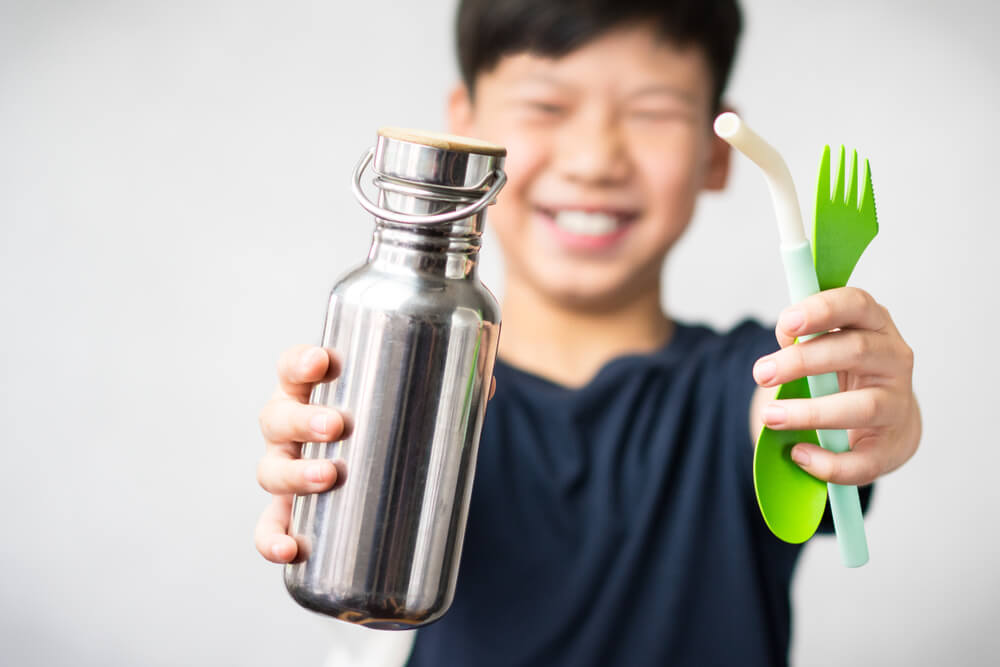
From there, the topic can expand into causes that you believe in—such as easy ways to compost, or choosing local produce—and it is simple for anyone to do their part in the fight against climate change.
Sharing a personal experience as to why you have kick start your own journey to sustainability may just be the push that they need to start their own.
Together, we can make a difference
Committing to having a conversation on climate change with someone in your social circle can be a simple and powerful tool to make a difference. As individuals, we might only have a little influence over macro policies, but productive conversations are a first step in building a community and moving towards action.
We have shown that we can work together as a global community to act for a cause. While we continue to stay home and play our part in combatting COVID-19, we can also look at this as an opportunity to raise awareness for a greater cause. After all, when we work together, small personal actions can turn into big differences.
Here’s a way to get the ball rolling on the topic of climate change: tell your friends and family members about Geneco’s #stayhomewithgeneco challenge and the chance to win $100 worth of Dairy Farm vouchers! All they have to do is complete a green craft as a family and share it on Instagram. Not only do they cultivate a green habit, they can get rewarded for it too!
Competition ends on Thursday, 7 May, and more details can be found on our Instagram page.
References:
- Elangovan, N. (2020, June 5) Singapore households generated additional 1,334 tonnes of plastic waste during circuit breaker: Study, Today Online.
https://www.todayonline.com/singapore/singapore-households-generated-additional-1334-tonnes-plastic-waste-during-circuit-breaker
Image Credits: Nylon Coffee Roasters
Source: The Sustainability Project
4 ways you can celebrate Earth Day while you #stayhomewithgeneco
- Home
- 2020 (
- Page 2 )
[Post Date]
4 ways you can celebrate Earth Day while you #stayhomewithgeneco
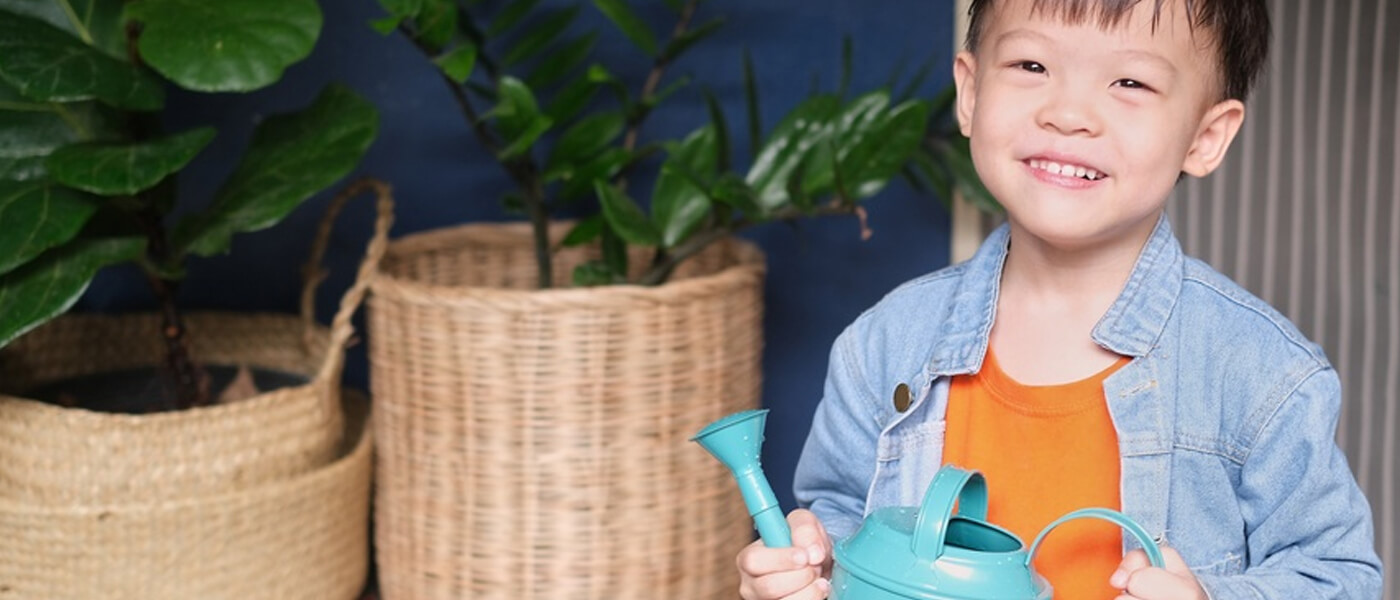
Earth Day 2020 marks the 50th anniversary of the occasion, but this year’s celebration will be starkly different.
The current COVID-19 situation has seen the world implement safe distancing measures, requiring us to stay indoors to protect ourselves and the community. While the focus is now on this outbreak, global warming is still very much a long-term challenge for all us. There is still a need to maintain our emphasis in raising environmental awareness.
Although it was traditionally gathered outside at various events to commemorate Earth Day since 1970, we can still act together – from our homes – for a more sustainable future. As the world continues to battle COVID-19 and climate change, be a part of Earth Day to honour our planet.
Here are four ways you can do so while staying at home:
1. Plan a meal with locally sourced ingredients
This Earth Day, why not opt to use locally grown produce and ingredients in your cooking adventure?
A pioneer in the Singapore urban farming scene, Comcrop – partner of ChangeMakersSG, uses advanced hydroponic technology to grow their produce without the use of harmful pesticides or herbicides. Produce grown locally have a lower carbon footprint, as compared to imported vegetables. This translates to less food loss through the supply chain while at the same time supporting local businesses.
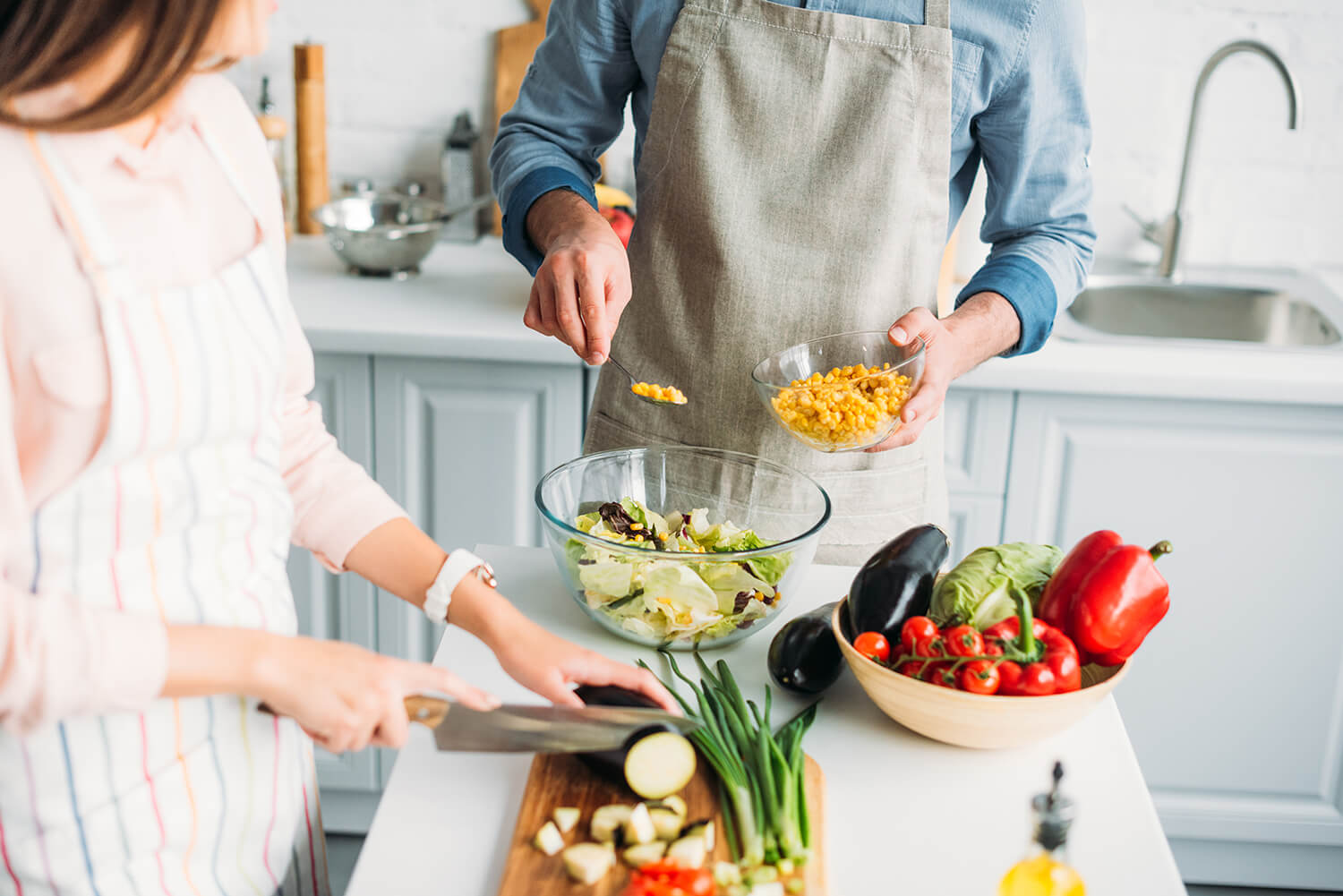
2. Create your own Food Scrap Garden
Growing vegetables from your home kitchen is actually easier than you think! Anyone can start your own food scrap garden by growing vegetable parts you usually dispose. This is a great way to reinforce the sustainable living concepts of recycling and reusing for the entire family.
To learn more on how to make your own compost, check out another partner of our ChangeMakersSG, Cultivate Central – a local social enterprise that seeks to empower people to live sustainably. They believe that there is abundance in small spaces, and it is possible for everyone to grow food right from our homes.
You will be surprised that some of the vegetables you can grow in your food scrap garden include bok choy, avocados, celery and onions! The possibilities are endless, and it may just be the project that you need while staying in.
3. Pick a Movie with an Eco-friendly Theme
Over the last 50 years, numerous films and documentaries have shared deeper insights to global warming and climate change. Pick a family movie with an environmentalism theme for your next movie night to inspire your little ones on this day. It may spark the power to create change inside of them to do good to the Earth! Some of our recommendations include – March of the Penguins and Wall-E.

4. Get Crafting with some Green Projects
Creating sustainable art is an excellent way to spend time indoors and still connect with the Earth. Repurpose materials from around the house and encourage the kids to be creative in what they can make with it. Here’s an idea for the kids to try – create their own stationery holder using toilet rolls, or put together a simple no-sew mask!
For more inspirations, Geneco has launched Power Famtime Fridays as part of our #stayhomewithgeneco series on Instagram! Stand to win $100 worth of Dairy Farm vouchers by sharing with us how you are bonding together as a family over some green crafts. 10 lucky winners will be selected on May 8. Find out more here.
References:
- Elangovan, N. (2020, June 5) Singapore households generated additional 1,334 tonnes of plastic waste during circuit breaker: Study, Today Online.
https://www.todayonline.com/singapore/singapore-households-generated-additional-1334-tonnes-plastic-waste-during-circuit-breaker
Image Credits: Nylon Coffee Roasters
Source: The Sustainability Project
ChangeMakersSG: Celebrating a Year of Partnerships Towards a More Sustainable Future
- Home
- 2020 (
- Page 2 )
[Post Date]
ChangeMakersSG: Celebrating a Year of Partnerships Towards a More Sustainable Future
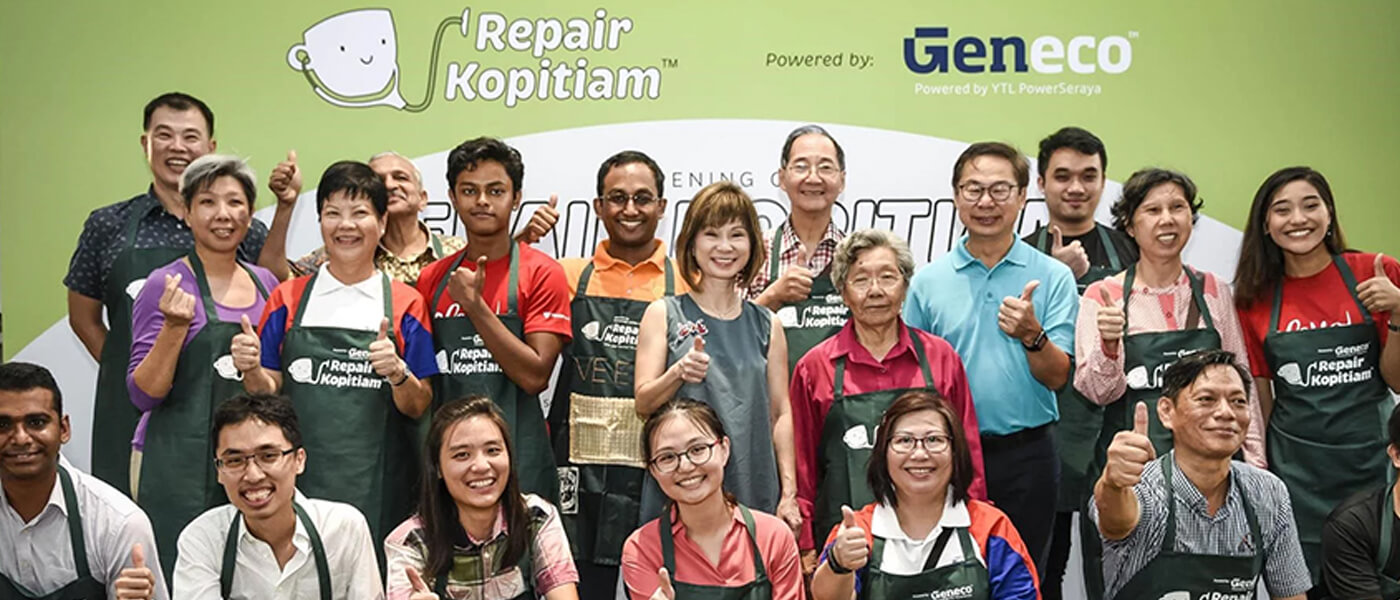
Here at Geneco, we continuously strive to be a green champion by exploring green initiatives to promote a more sustainable lifestyle for our future generations.
However, we know that we can’t do it alone. While each of us can contribute individually, working together as a community creates powerful change—which is why we are always looking for opportunities to collaborate with like-minded partners. The theme for our 2nd anniversary, #ItTakes2, also reflects this, as we look to celebrate and build on community efforts that have spurred change, such as our ChangeMakersSG programme, which was developed to encapsulate this spirit of partnership.
Now, let’s have a throwback as we take a look at some of our key collaborations with our ChangeMakers over the past year that have reached out, involved and inspired a wider community:
1. From Farm to Table with Comcrop
With Singapore importing more than 90% of the food we eat, local farms may not be the first thing that comes to your mind when you think about food sources for the nation.
However, Comcrop, Singapore’s urban farming pioneer, wants to change that. Founded in 2014, Comcrop wants to build a sustainable future in which Singaporeans can have easy access to healthy, locally produced food. Their produce is sustainably farmed using advanced hydroponic technology that uses 90% less water than traditional farming, and free from harmful pesticides or herbicides.
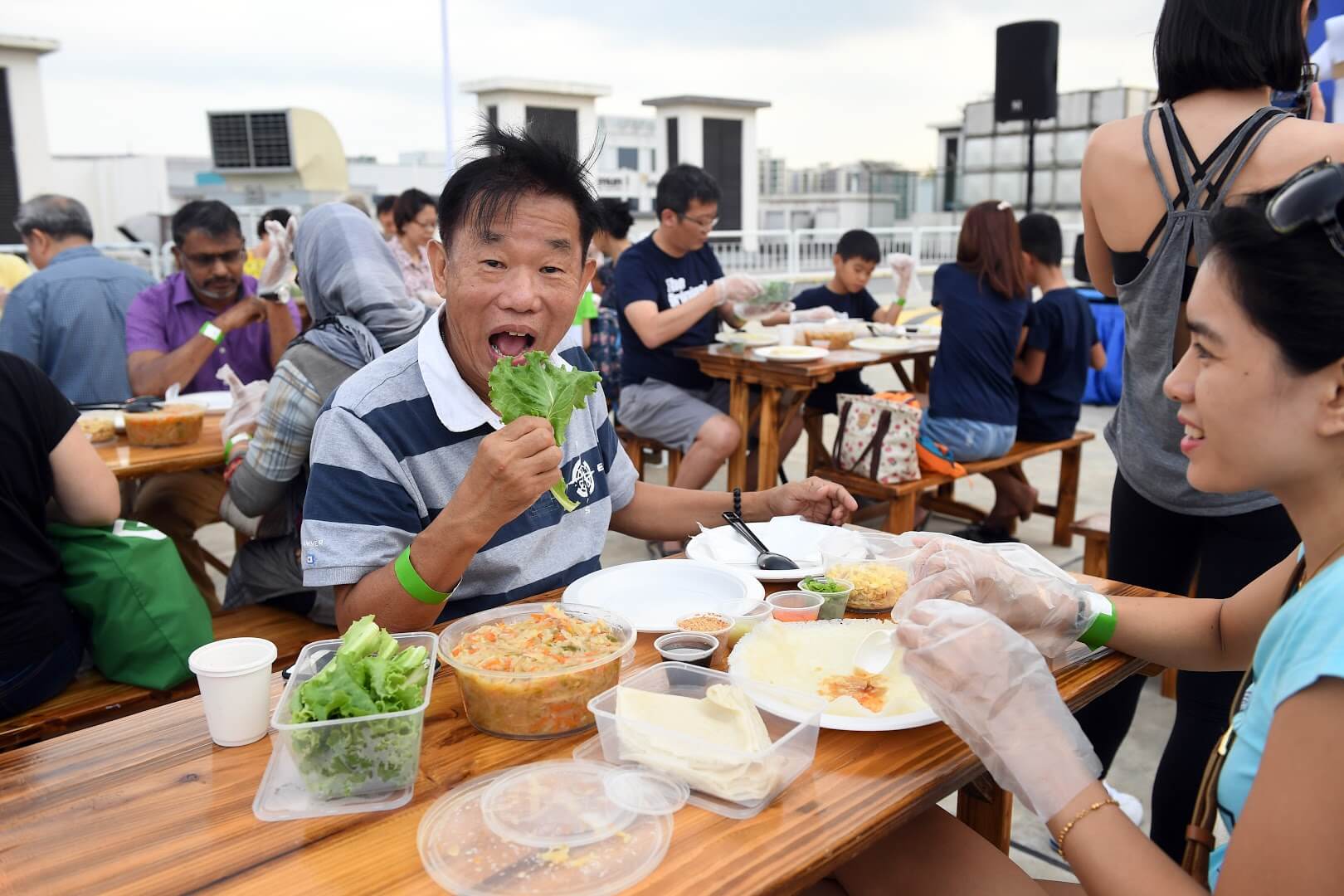
Geneco customers having their hand at making their own popiah using locally grown vegetables
We collaborated with Comcrop to organise a Farm-to-Table Popiah Making Party. Exclusive to our customers, the event provided participants with a unique food experience, as they used ingredients that were grown on-site at Comcrop’s urban rooftop farm complex in Woodlands.
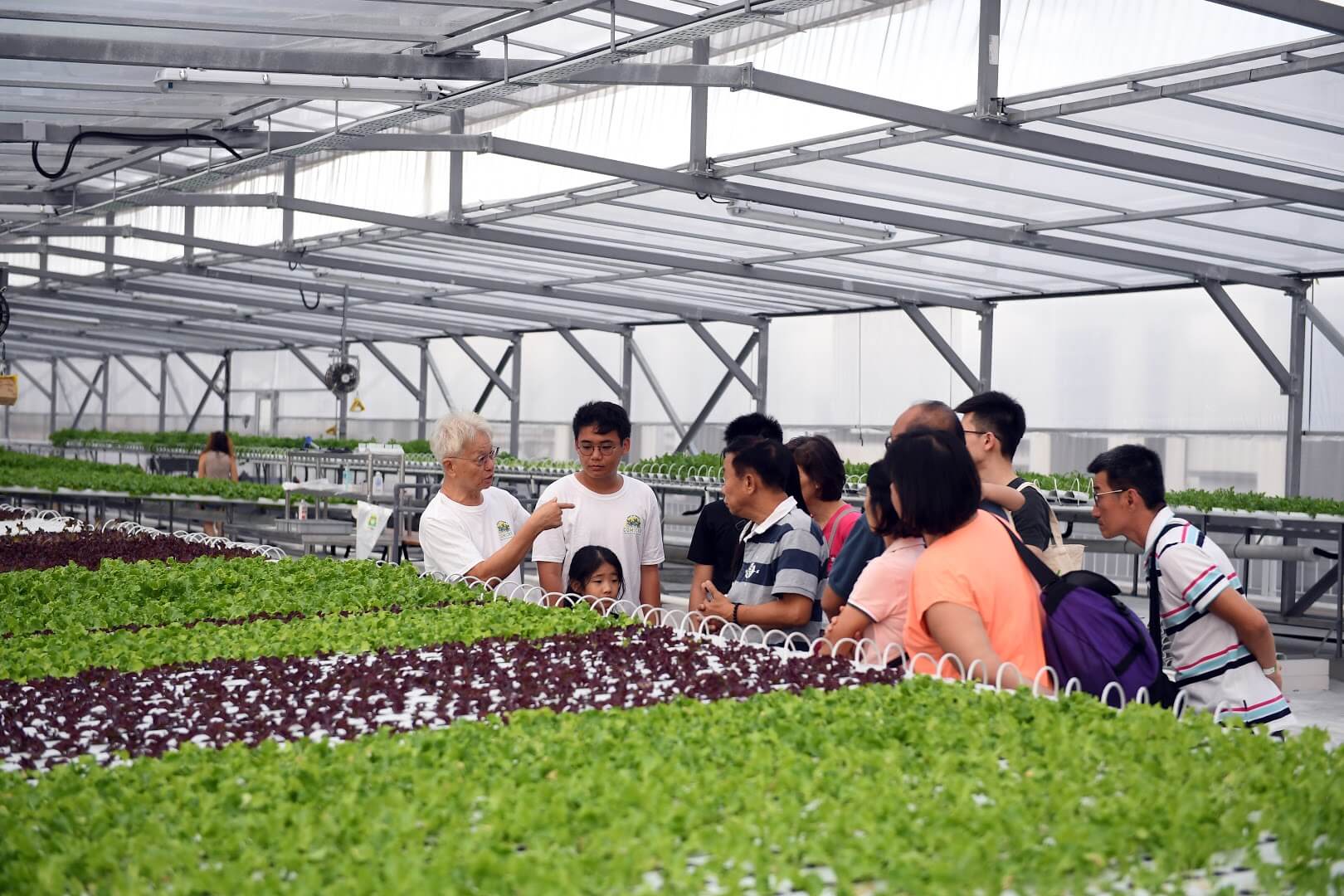
Urban agricultural farm tour for Geneco customers
More than just filling up their bellies, our customers also brought home the knowledge of how food can be grown sustainably in this city state through urban agriculture.
2. Instilling sustainability habits from young with Cultivate Central
Cultivate Central started in 2014 because of a single vision – to create urban food gardens that connect children to nature, giving them a space to learn how to grow their own food and to live sustainably. Through various hands-on programmes and activities, Cultivate Central aims to help Singaporeans discover nature.
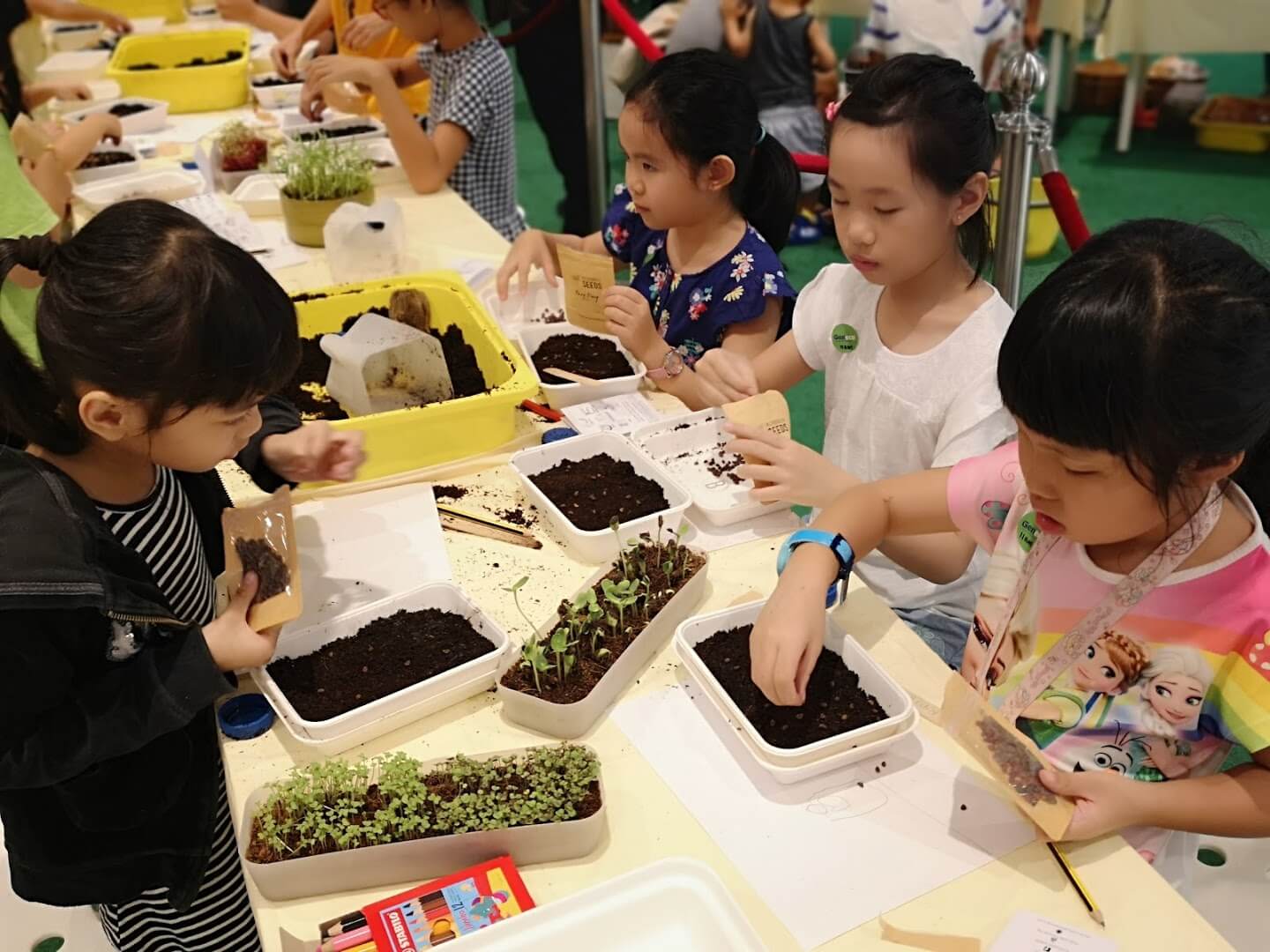
Children learning how to grow and care for their microgreens at our workshops with Cultivate Central
During the March school holidays, Geneco partnered Cultivate Central to create a series of specially curated urban food garden workshops for children to learn what they can do to protect the earth for their future.
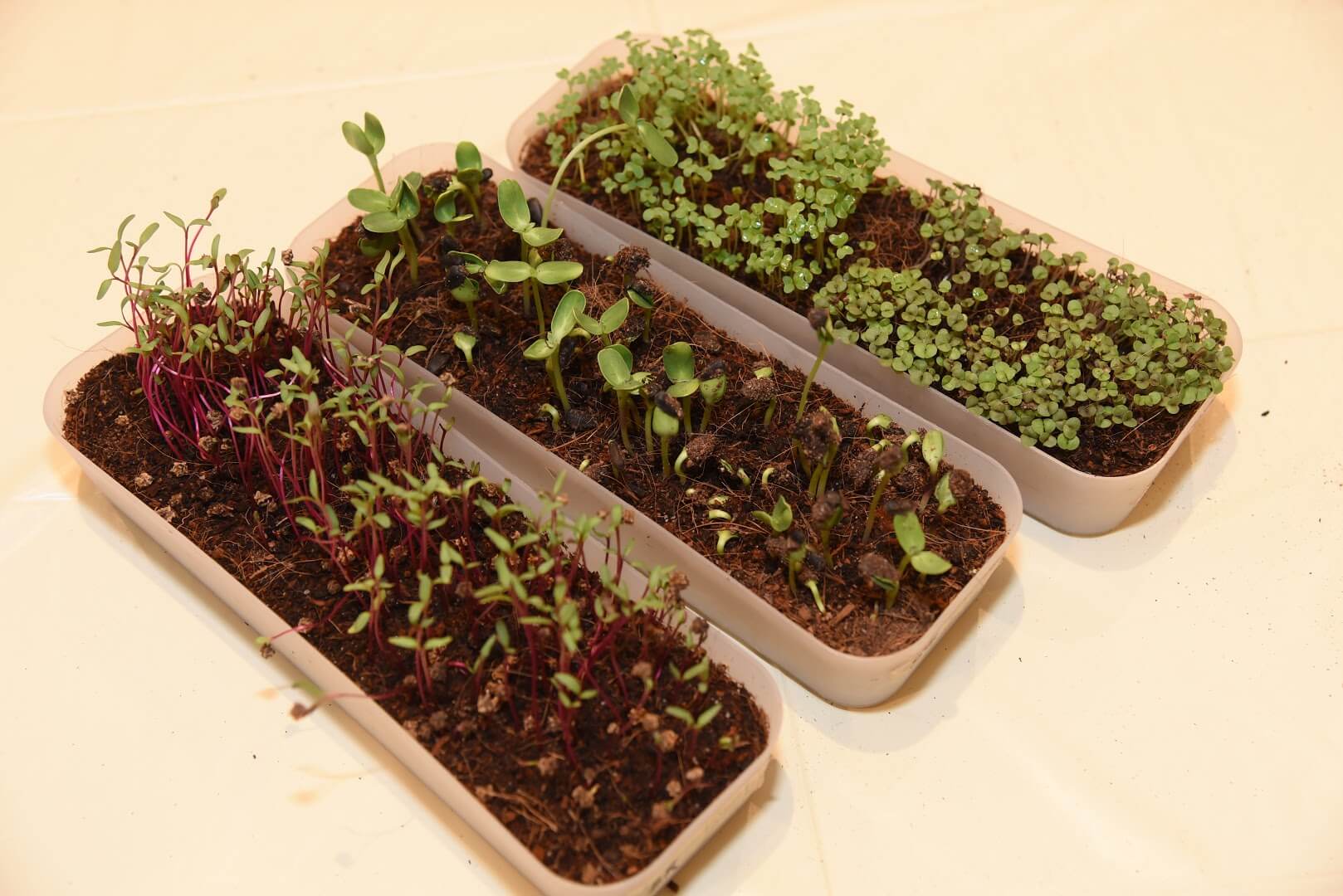
Carefully planted Microgreen plants by the customers and their children
Participants had the opportunity to have a hands-on experience, learning about growing, caring, harvesting and even preparing microgreens for consumption. A special kit was put together to give children a chance to mix the soil and sow the seeds, before they are greeted with their fruits (or vegetables) of labour, which included Kang Kong, Broccoli and Red Radish.
Remember, one is never too small to make a difference in sustaining a green future!
3. Feeding communities with Food Bank Singapore
Food waste is a critical issue for Singapore. In fact, it is one of the biggest waste streams in Singapore and the amount of food waste generated in Singapore has grown by 30 per cent over the past 10 years and amounted to 763 million kg of food waste generated in 2018.
The Food Bank Singapore was founded to create a centralised food resource management in our country to allow for unwanted or unused food to be given to those in need, rather than going to waste.
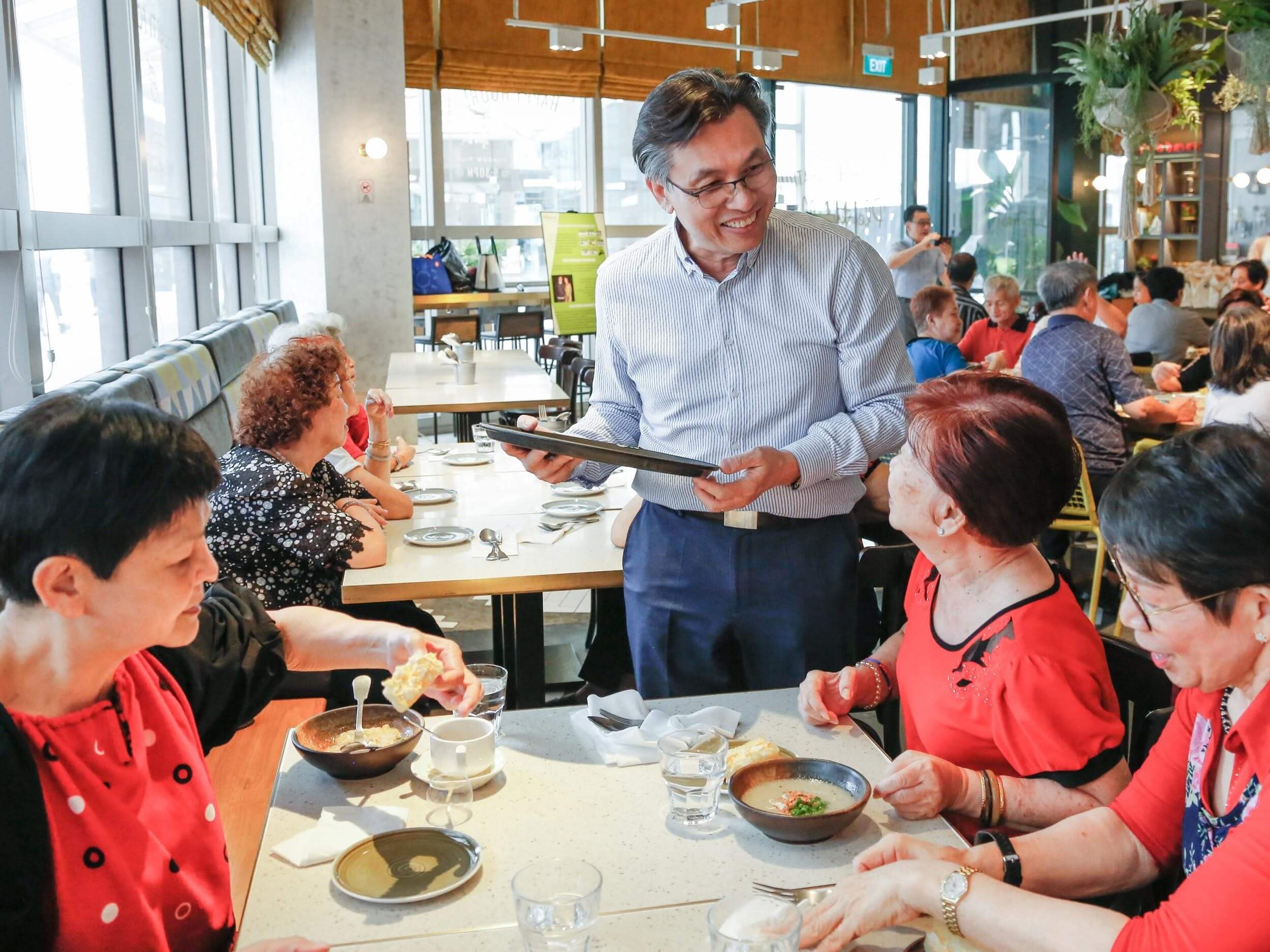
Putting a smile on everyone’s face as Executive Vice President of Geneco, Mr Low Boon Tong, serves the dishes to the beneficiaries
Understanding the need to raise awareness surrounding the issue of food waste, we partnered Food Bank Singapore to engage the elderly community at our “Feed the City” event. Held at Plentyfull, employees from Geneco took time off to volunteer with the Food Bank to serve and engage with the elderly with an afternoon of games alongside the delectable spread.
And what a joyous afternoon it was! By the end of the event, the restaurant was filled with laughter where everyone was on their feet, dancing and belting out to their favourite tunes.
4. Launching a repair culture in the heartlands with Repair Kopitiam
The common practice whenever an appliance breaks down would be to dispose it. How many of us do think about the possibility of repairing the item to restore it to its original condition?
With the culture of convenience, it is no surprise that most Singaporeans would succumb to simply buying a replacement. The thought of repairing may have never crossed their minds, when in fact, a simple repair can breathe in new life.
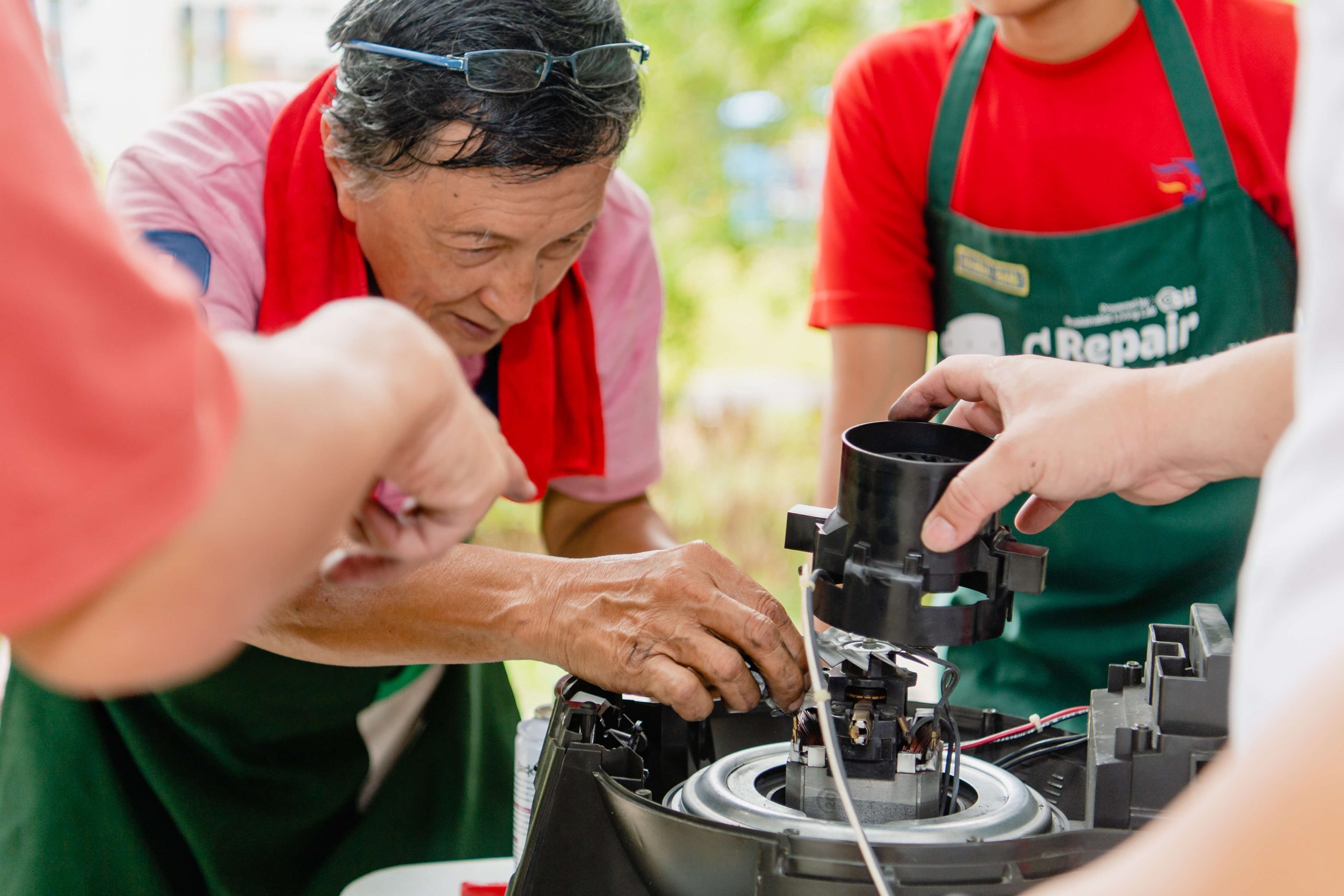
Repair coaches guiding residents on how to repair their appliances
By showing people how easy it is to put a stop to our throwaway culture, Repair Kopitiam hopes to promote sustainable living among Singaporeans and, eventually, reduce waste for good.
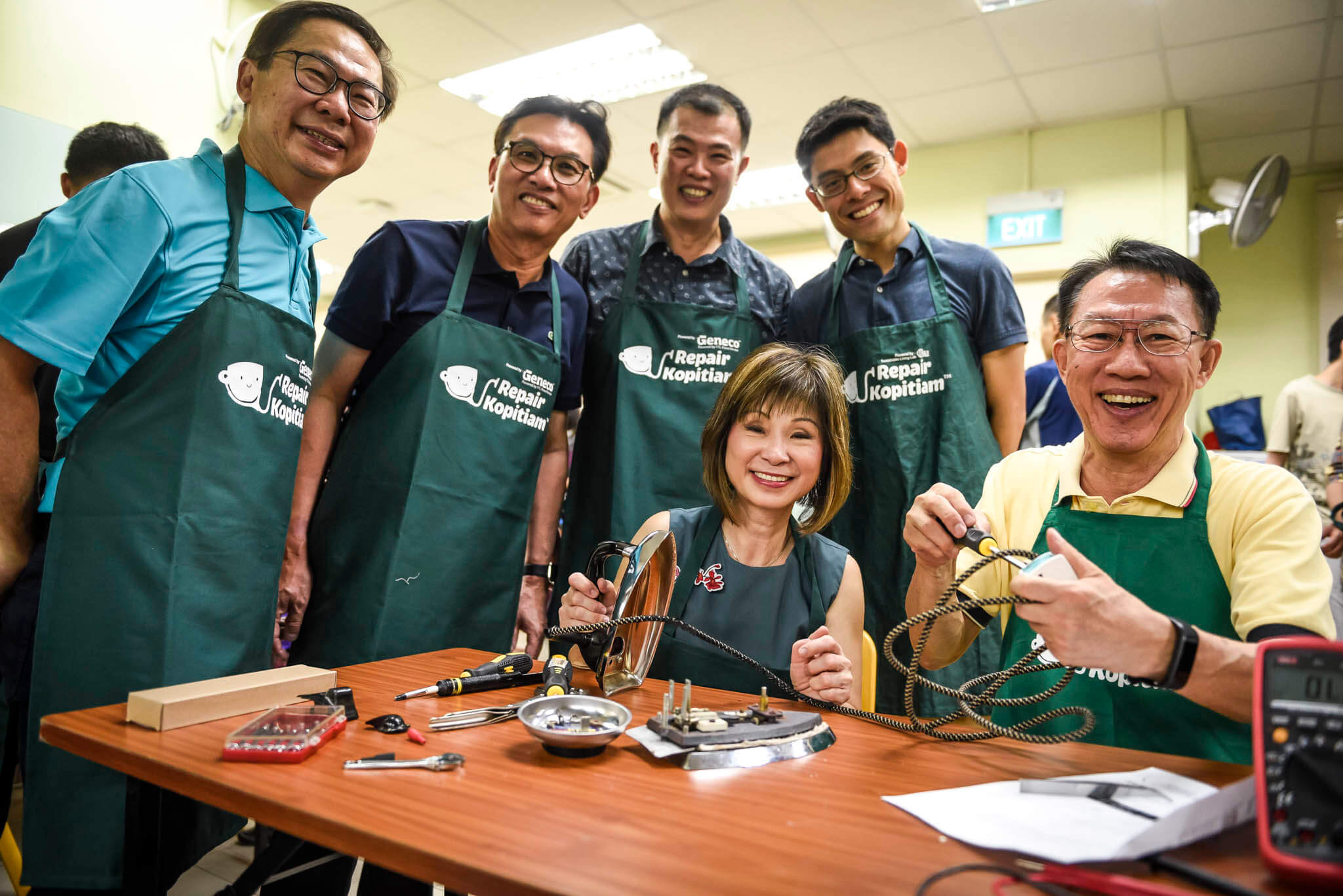
Mr. John Ng, CEO of YTL PowerSeraya , Mr. Low Boon Tong, Executive Vice President of Geneco and Dr. Amy Khor, Senior Minister of State for the Ministry of the Environment and Water Resources, learning from repair coaches at Repair Kopitiam’s third official location in Ang Mo Kio
To spread this message to more Singaporeans, Geneco helped Repair Kopitiam launch its third location in Ang Mo Kio, to focus on residents in the central heartlands of Singapore. This official launch was graced by Dr. Amy Khor, Senior Minister of State for the Ministry of the Environment and Water Resources. Together with Mr. Veerappan Swaminathan, founder of Repair Kopitiam and Mr. John Ng, our CEO, Senior Minister Dr. Amy Khor presented the aprons to the inaugural batch of Repair Coaches from the area.
Through monthly repair sessions at the various sites within Singapore, Repair Kopitiam hopes to inspire more communities to not only think twice about their consumption habits, but to also be part of the growing repair culture.
5. Celebrating a green Christmas
Last Christmas, Geneco decided to open its very own Christmas Lodge at The Atrium of Wisma Atria. Our customers and shoppers were invited to be participate in a green Christmas through our sustainable crafting workshops.
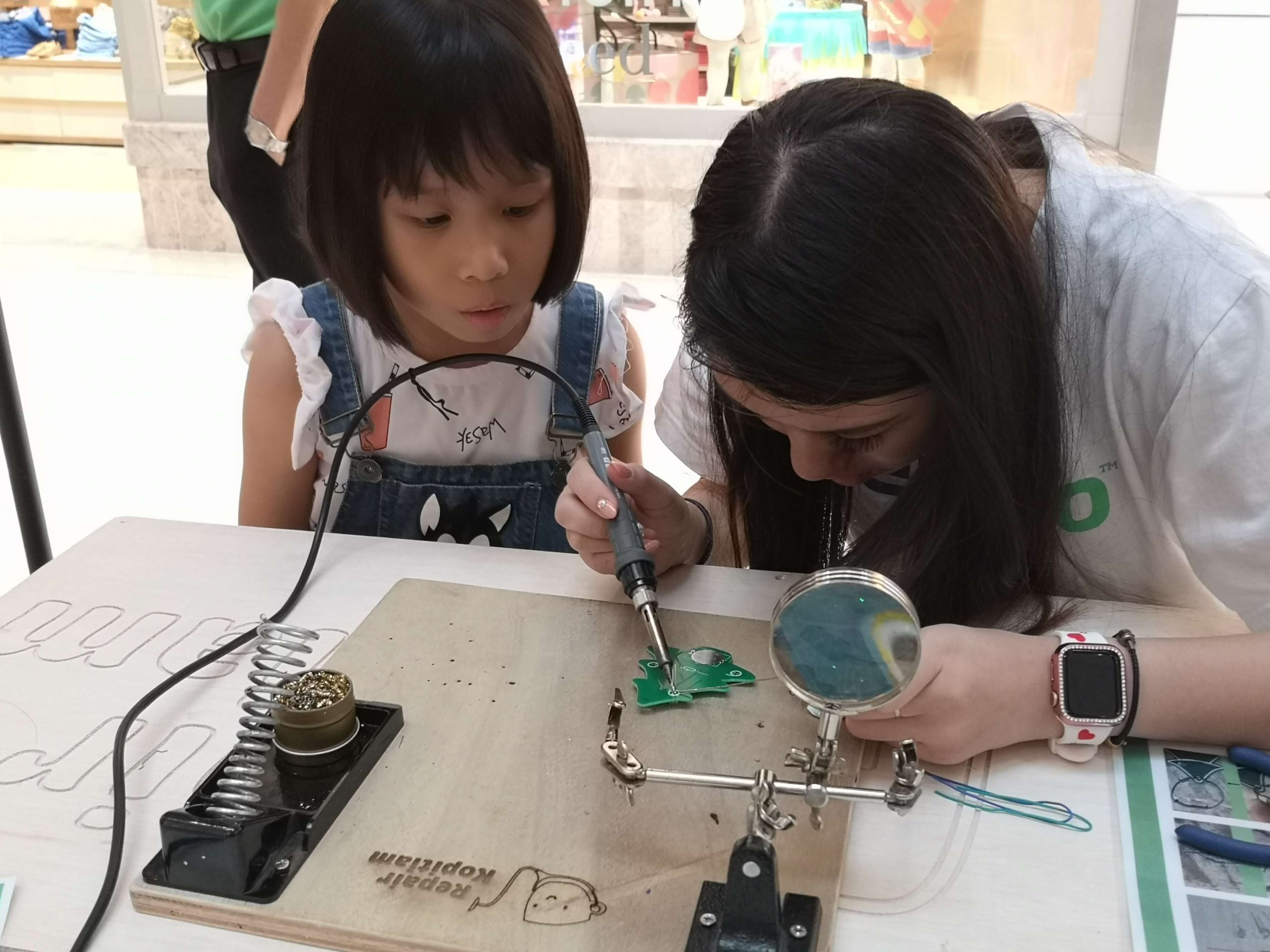
Participants making their very own LED dancing Light Christmas Ornaments
Held every week for the month of November, we partnered with Cultivate Central and Repair Kopitiam to organise workshops comprising sustainable craft activities, including Cocodama moss ball Christmas decorations, and LED-light ornaments.
We also brought our festive joy to our customers with sustainably brewed coffee in special Christmas flavours and even challenged them to light up their own LED Christmas Tree by generating power on our kinetic bicycles.
It’s been an inspiring journey so far, and it wouldn’t have been possible without the support from all our partners and customers! #ItTakes2 to bring about real change, and we look forward to powering the change with you in building a more sustainable nation for our future generations!
If you are interested and would like to learn more of Our ChangeMakersSG programme, you can visit here.
From vitamins to staying stress-free: Tips for staying virus-free this flu season
- Home
- 2020 (
- Page 2 )
[Post Date]
From vitamins to staying stress-free: Tips for staying virus-free this flu season

“Do you have enough face masks?” has become a common question since the outbreak of the novel coronavirus, which is now known as COVID-19. Spreading rapidly, the virus is the top priority across various cities with many following the tips issued by the World Health Organization on protection and safety.
We’ve all seen listicles advocating for the wearing of masks (if you’re unwell) in crowded places, washing your hands and the use of hand sanitisers. Outside of that, however, what else can we do to stay healthy – and calm – during the flu season, especially in the midst of a coronavirus outbreak?
To save all of us from some worry, we put together this guide on best practices and top tips on how we can stay healthy during an outbreak.
Maintain regular health checks and get vaccinated!
It’s not too late to get the flu vaccine, but it’s important to get it when you’re healthy. This is especially important for the young, the elderly and those with compromised immune systems.
While it may not prevent coronavirus, it will help build your immunity system against the more common seasonal influenzas—which will also reduce the risk of pneumonia or other complications.
It’s also important to maintain regular check-ups—at least on an annual basis. Such regular check-ups can help identify health issues early, before they become a problem. They also give you the best chance for getting the right treatment quickly, avoiding any further complications.
Watch your diet
Did you know: the top three nutrients to ensure a strong immune system are vitamin C, zinc and iron? The benefits of vitamin C to boost immunity are well documented, and it works best as a preventive measure, rather than a reactive one—meaning that people should take it before the onset of cold or flu symptoms. Vitamin C can be easily found in its natural form, within fruit and vegetable sources such as oranges, grapefruit, kiwis, bell peppers and broccoli!
Additionally, a zinc deficiency is also associated with increased susceptibility to pneumonia and other infections in children and the elderly—but the nutrient can be easily found in poultry, breakfast cereals, beans, as well as nuts.
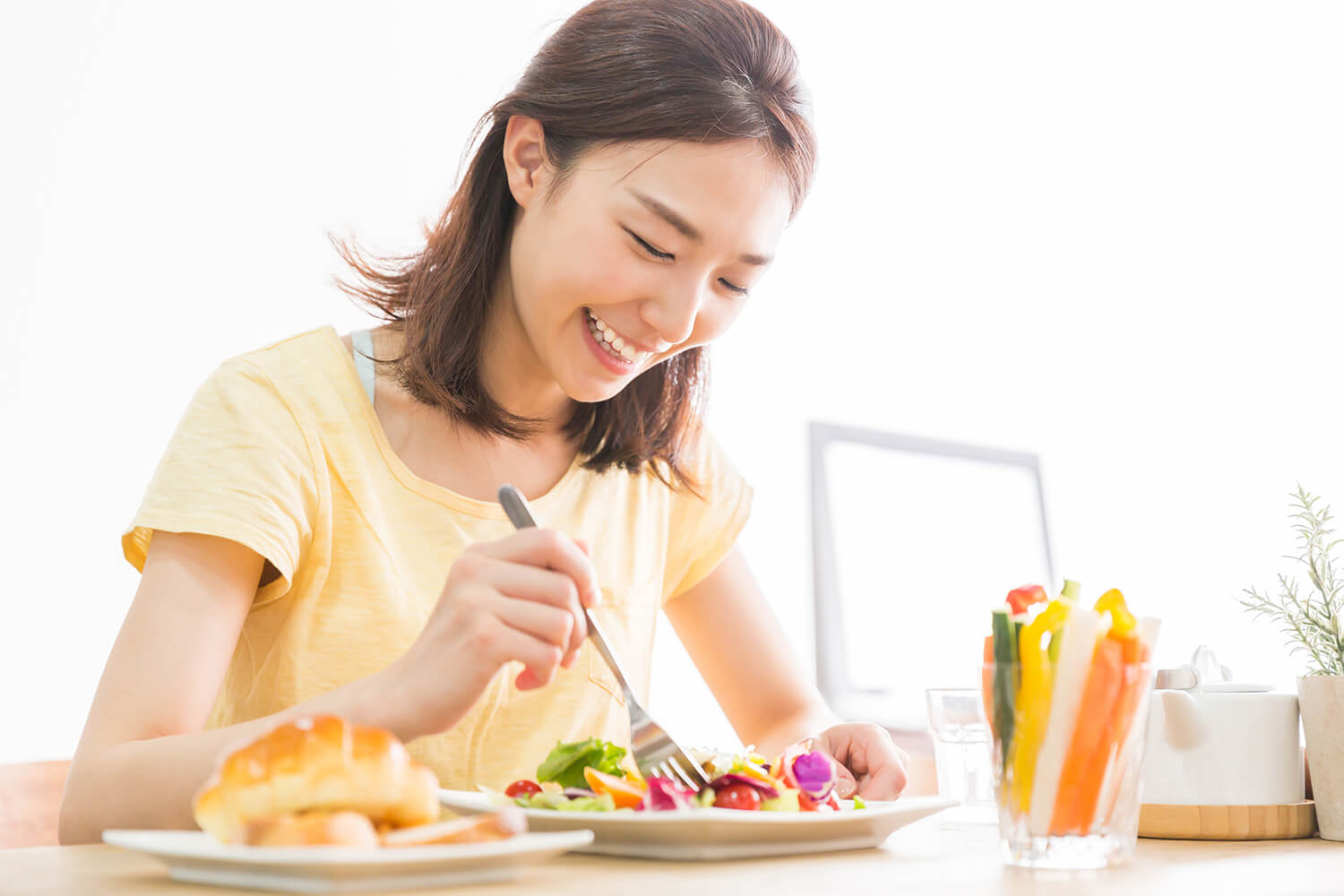
Breath through your nose
This might sound silly, but breathing through your nose instead of your mouth is one of the best things you can do when there is a virus going around. Air entering the body through the nose is warmed, humidified and filtered before it gets to the lungs—making a huge difference in terms of purifying the air. Even when wearing a mask (which can get hot and difficult sometimes), it’s best to continue to breathe through the nose.
Sleep well, and take time out for yourself
Ensuring that you get enough sleep is important as sleep is the body’s most effective method of recovering, which is a key tenet in keeping healthy.
A lack of sleep can affect your immune system, with studies showing that people who don’t get enough sleep are more likely to fall sick if they are exposed to a virus. In addition, infection-fighting antibodies and cells are reduced during periods when you don’t get enough sleep.
So, your body needs sleep to fight infectious diseases. Long-term lack of sleep also increases your risk of obesity, diabetes, and heart and blood vessel (cardiovascular) disease.

It’s also important to take time to do the things you love, whether it is yoga, cooking, or an art class. Stress can inhibit some of the immune functions, and taking time out for yourself is a way to reduce that stress.
Move!
“The fitter you are, the stronger your immune system.”

Regular exercise such as aerobics and walking can boost the immune system, with a study finding that “feeling fit and being active cut the risk of having a cold by nearly 50%”. In addition, those who exercise regularly also recover more quickly.
Exercise helps balance stress hormones such as cortisol (which in large amounts, is a hormone that suppresses your immune function), and changes T-cells, a type of white blood cell, to the ones that are better at fighting disease.
With the onset of the COVID-19 across various cities, it is important to remember that we all have a part to play. From showing care and support to healthcare workers at the frontline during this time, or being vigilant in ensuring our own health conditions are accounted for, we can overcome this crisis together as a nation.
References:
- Elangovan, N. (2020, June 5) Singapore households generated additional 1,334 tonnes of plastic waste during circuit breaker: Study, Today Online.
https://www.todayonline.com/singapore/singapore-households-generated-additional-1334-tonnes-plastic-waste-during-circuit-breaker
Image Credits: Nylon Coffee Roasters
Source: The Sustainability Project
